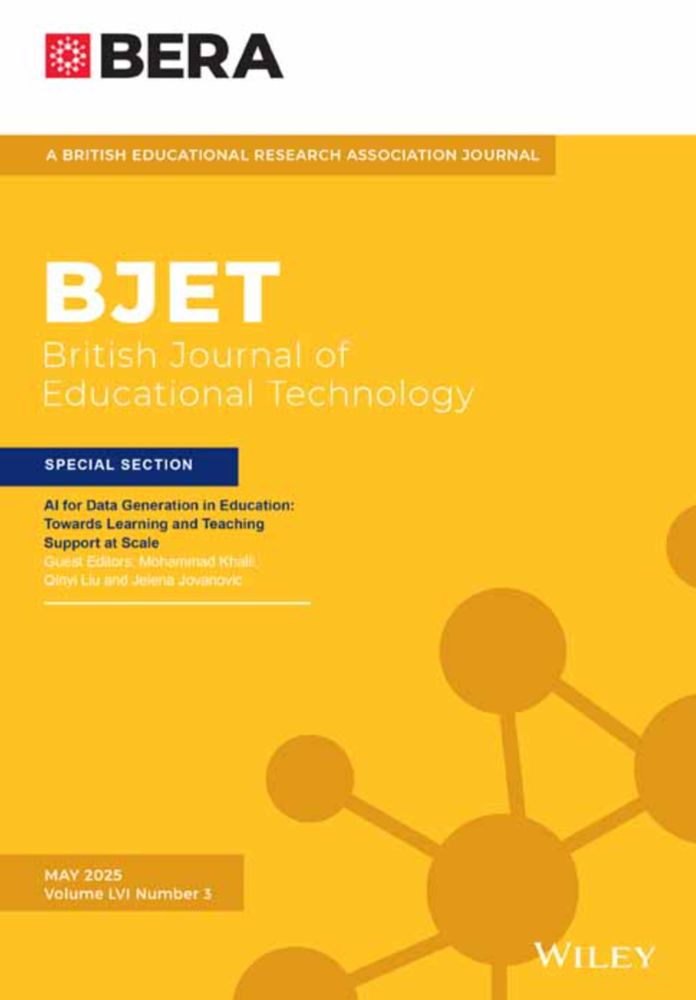
📢 New publication alert! "Beyond verbal self-explanations: Student annotations of a code-tracing solution produced by ChatGPT" by Abbey Gandhi and Kasia Muldner
bera-journals.onlinelibrary.wiley.com/doi/10.1111/...
@carleton-cogsci.bsky.social
Cognitive scientists study thinking in humans, animals, and machines.

📢 New publication alert! "Beyond verbal self-explanations: Student annotations of a code-tracing solution produced by ChatGPT" by Abbey Gandhi and Kasia Muldner
bera-journals.onlinelibrary.wiley.com/doi/10.1111/...
An open access journal article with Zoe Roy-Stang and @drjimdavies.bsky.social looks at how thinking biases might influence people's perception of dangers of AI. Remedies suggested, too! jimdavies.org/research/pub...
@carletonu.bsky.social @carleton-cogsci.bsky.social @mindingthebrain.bsky.social
Tyler is planning on incorporating musicianship into his PhD work. Other questions of interest are how musical improvisation is related to flow states or meditation. Making the most of the tools on hand and the 20 minutes available, this pilot study is a first step towards answering these questions.
26.04.2025 00:01 — 👍 0 🔁 0 💬 0 📌 0Leah Durham and Tyler Call @callmetyler.bsky.social, both Master's students in CANAL (Cognition and Neuroscience of Aging Lab) supervised by Dr. John Anderson @janderz8.bsky.social, and Jonathan Drucker (ANT Neuro) prepped EEG caps and guitars for a hyper scanning experiment with our fNIRS.
26.04.2025 00:01 — 👍 1 🔁 0 💬 1 📌 0What happens to your brain when you play music?
It is possible that music provides cognitive reserve, which is essentially your brain's resilience to damage, by altering the connectivity of functional networks.
👇
Dr. Kelly is an Assistant Professor (Carleton University Department of Cognitive Science) and director of the ANIMUS (Adaptive Neuromorphics, Intelligence, Memory, and Unified Systems) Lab, where she combines machine learning, psychology and philosophy to research ethical AI.
22.04.2025 14:02 — 👍 2 🔁 0 💬 0 📌 0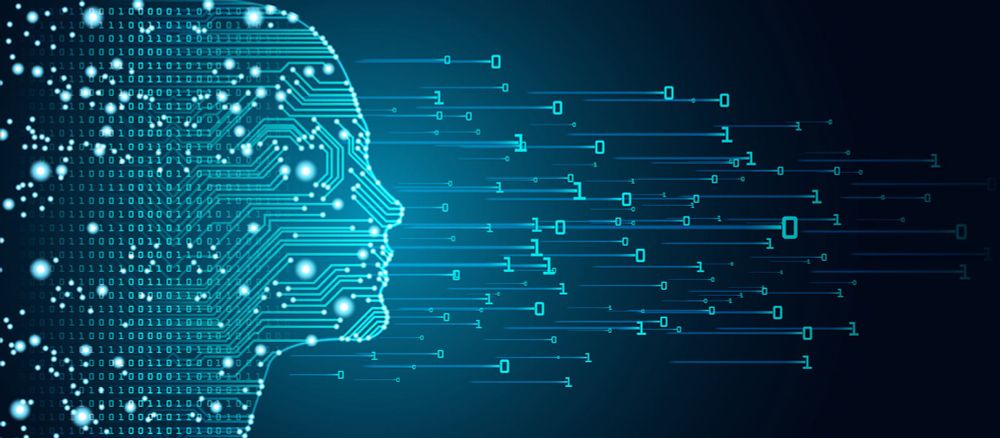
Dr. Mary Kelly is a panelist for an important discussion of "AI Impact – Ethics, Policy, Security and Risk" at the Carleton Challenge Conference.
To register for the conference: carleton.ca/challengecon...
Shoutout to our amazing team at @carleton-cogsci.bsky.social, and credit to Grad Student Taeko Bourque whose project this is
This is just the beginning — SNF and similar approaches are going to transform how we understand brain health in aging.
#neuroscience #alzheimer's
🧠 New preprint alert!
@carleton-cogsci.bsky.social PhD student Salah Aziz and our fantastic team tracked hippocampal changes over time in >1,300 individuals using surface-based morphometry (SBM).
Here's what we found—and why it matters for Alzheimer’s research 🧵
[1/]
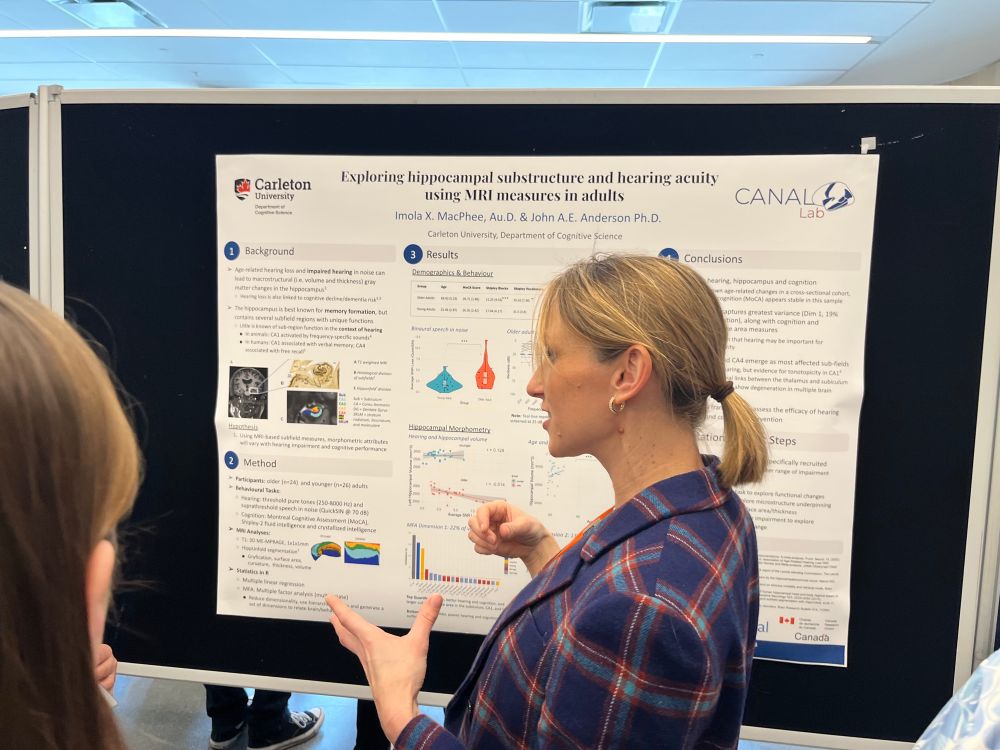
PhD candidate Imola MacPhee describing her hearing loss/hippocampal subfield findings
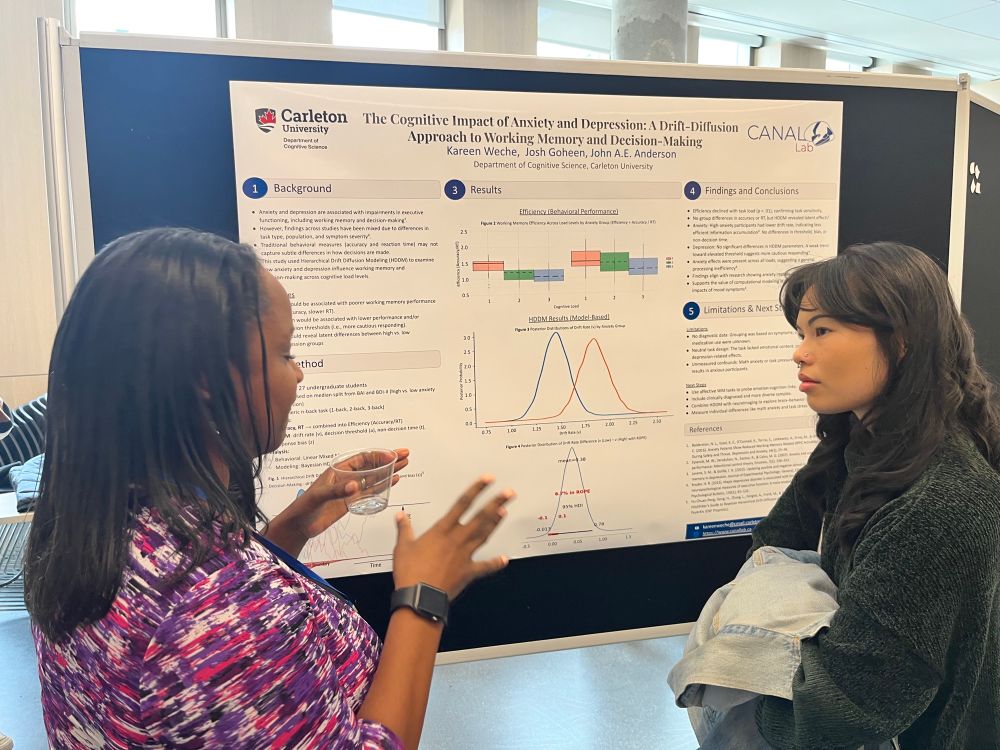
Undergraduate thesis student Kareen Weche showing her drift diffusion model of n-back performance being affected by anxiety
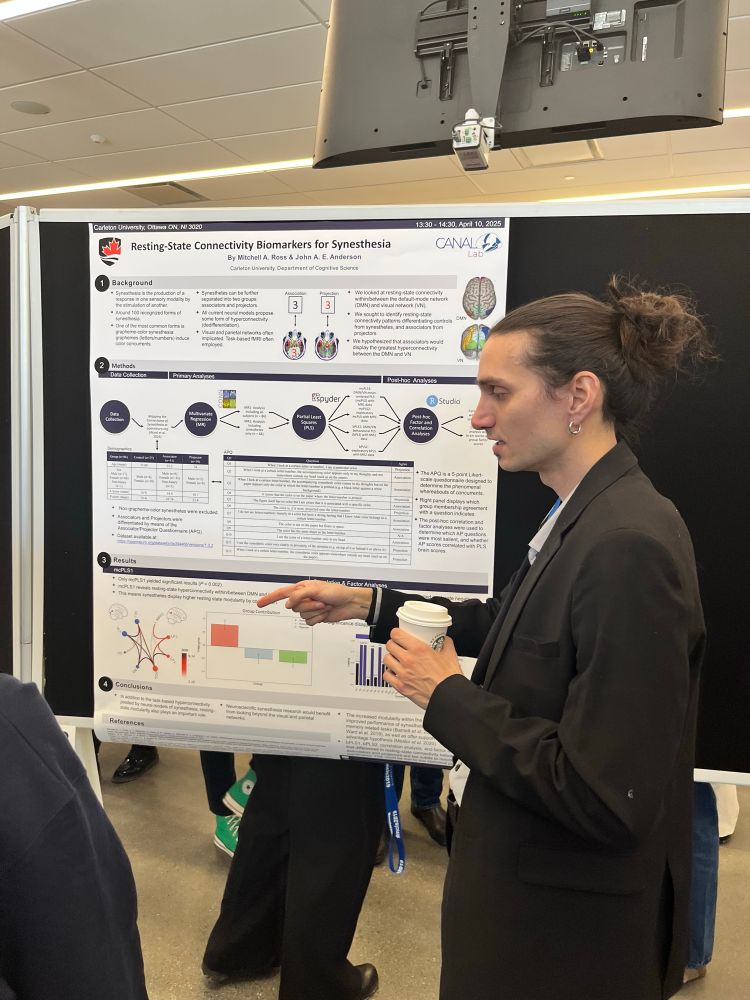
Method rotation student Mitch Ross showing his PLS analyses of resting state functional connectivity data in people with synaesthesia
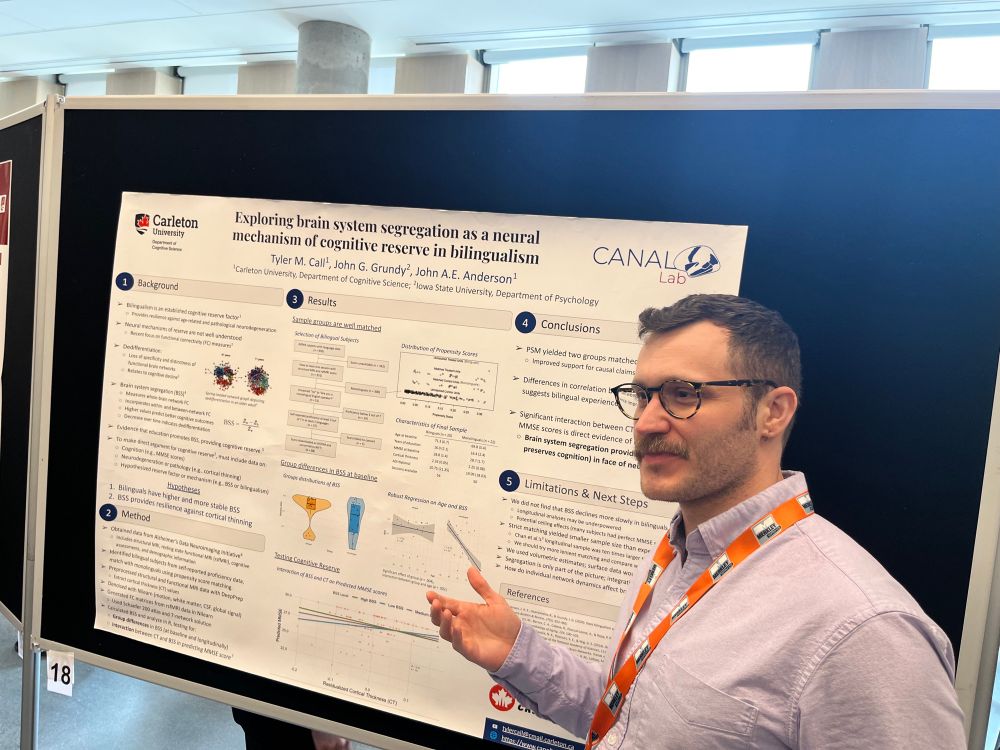
M.Cog.Sci. Student Tyler Call presenting his findings showing that bilingualism contributes to brain network segregation
Well done to members of the CANAL lab! Fantastic representation at Carleton’s Cognitive Science Student Conference @carleton-cogsci.bsky.social , @carletonfass.bsky.social
11.04.2025 00:07 — 👍 13 🔁 2 💬 1 📌 0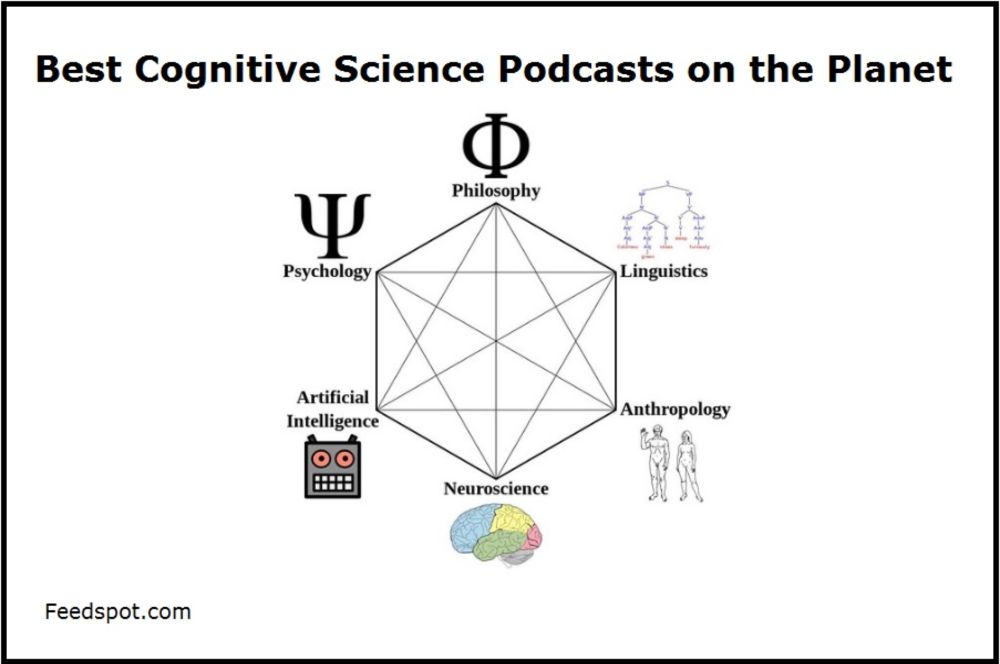
Minding the Brain was ranked number 8 in the best cognitive science podcasts by Feedspot!
podcast.feedspot.com/cognitive_sc...
@carletonu.bsky.social @carleton-cogsci.bsky.social @drjimdavies.bsky.social @drkimhellemans.bsky.social @mindingthebrain.bsky.social
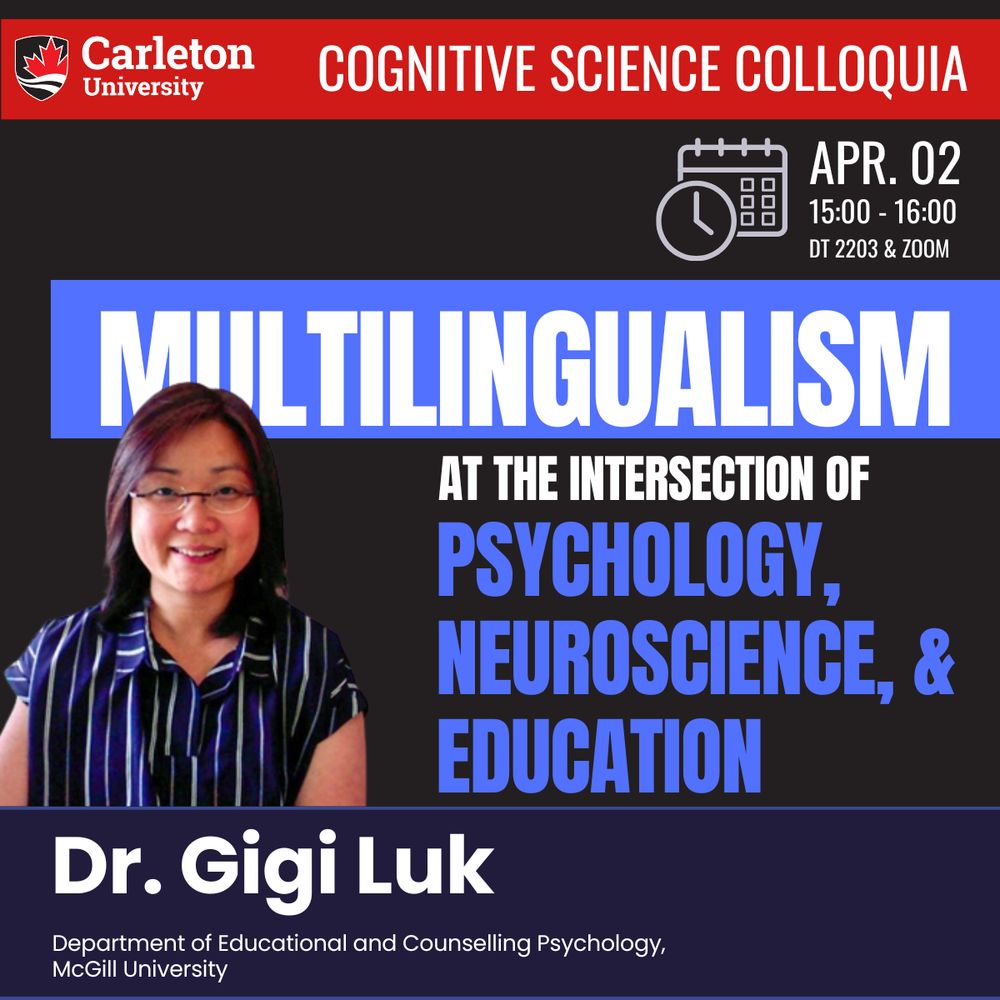
promo
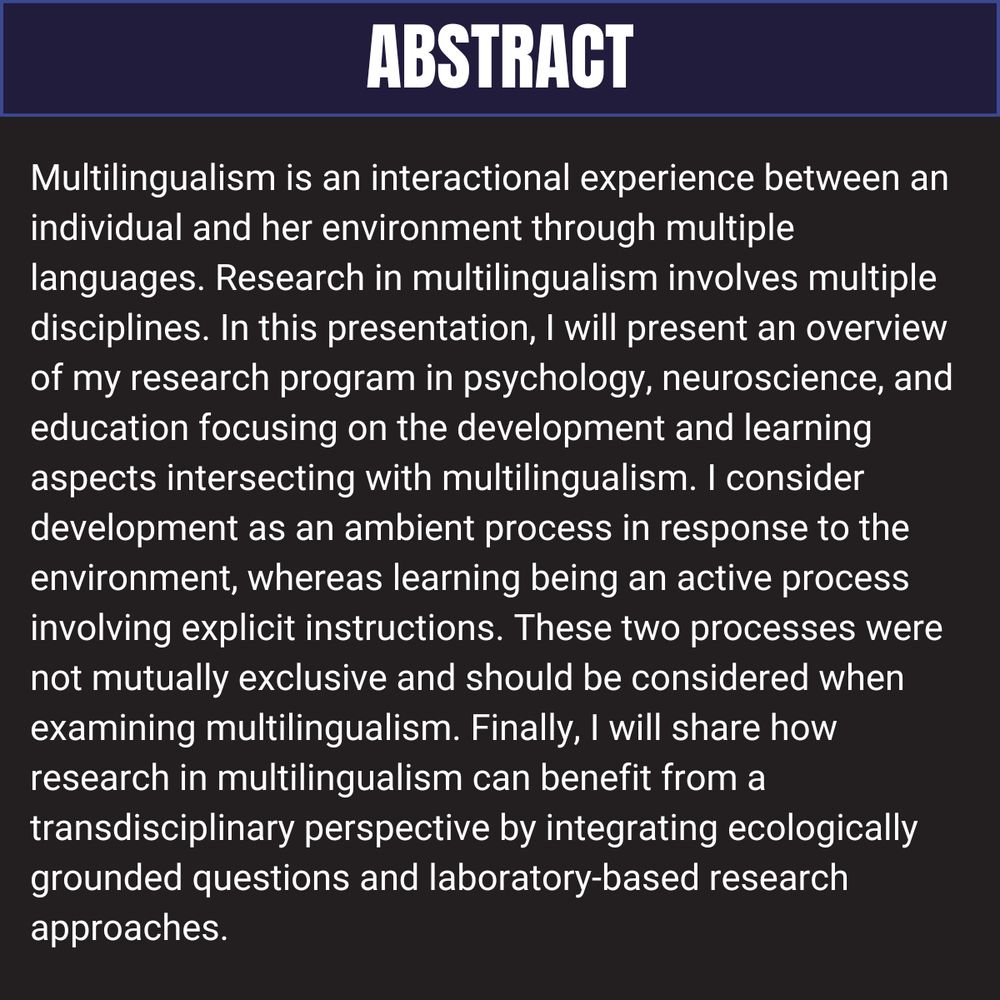
Multilingualism is an interactional experience between an individual and her environment through multiple languages. Research in multilingualism involves multiple disciplines. In this presentation, I will present an overview of my research program in psychology, neuroscience, and education focusing on the development and learning aspects intersecting with multilingualism. I consider development as an ambient process in response to the environment, whereas learning being an active process involving explicit instructions. These two processes were not mutually exclusive and should be considered when examining multilingualism. Finally, I will share how research in multilingualism can benefit from a transdisciplinary perspective by integrating ecologically grounded questions and laboratory-based research approaches.
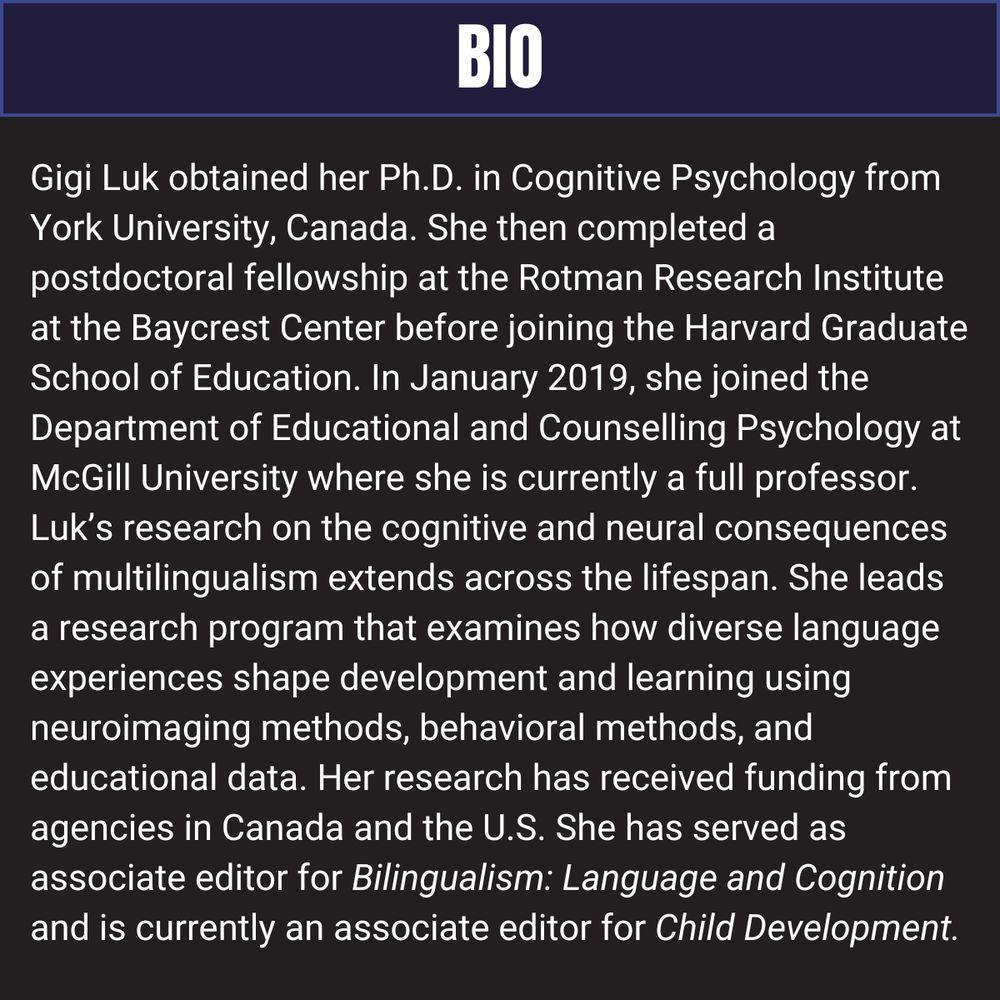
Gigi Luk obtained her Ph.D. in Cognitive Psychology from York University, Canada. She then completed a postdoctoral fellowship at the Rotman Research Institute at the Baycrest Center before joining the Harvard Graduate School of Education. In January 2019, she joined the Department of Educational and Counselling Psychology at McGill University where she is currently a full professor. Luk’s research on the cognitive and neural consequences of multilingualism extends across the lifespan. She leads a research program that examines how diverse language experiences shape development and learning using neuroimaging methods, behavioral methods, and educational data. Her research has received funding from agencies in Canada and the U.S. She has served as associate editor for Bilingualism: Language and Cognition and is currently an associate editor for Child Development.
📢 Join us this Wednesday, April 2, 15:00-16:00EST to learn about "Multilingualism at the intersection of psychology, neuroscience, & education" with Dr. Gigi Luk
Everyone is welcome! Join on campus (DT2203) and via Zoom carleton-ca.zoom.us/j/94196446262
New @mindingthebrain.bsky.social episode: Question and Answer, about ape brains, evo psych's rep... Listen! mindingthebrainpodcast.com/2025/03/15/a...
or watch at
youtu.be/o_AugoVFs80
@carletonu.bsky.social @carleton-cogsci.bsky.social @drjimdavies.bsky.social @drkimhellemans.bsky.social
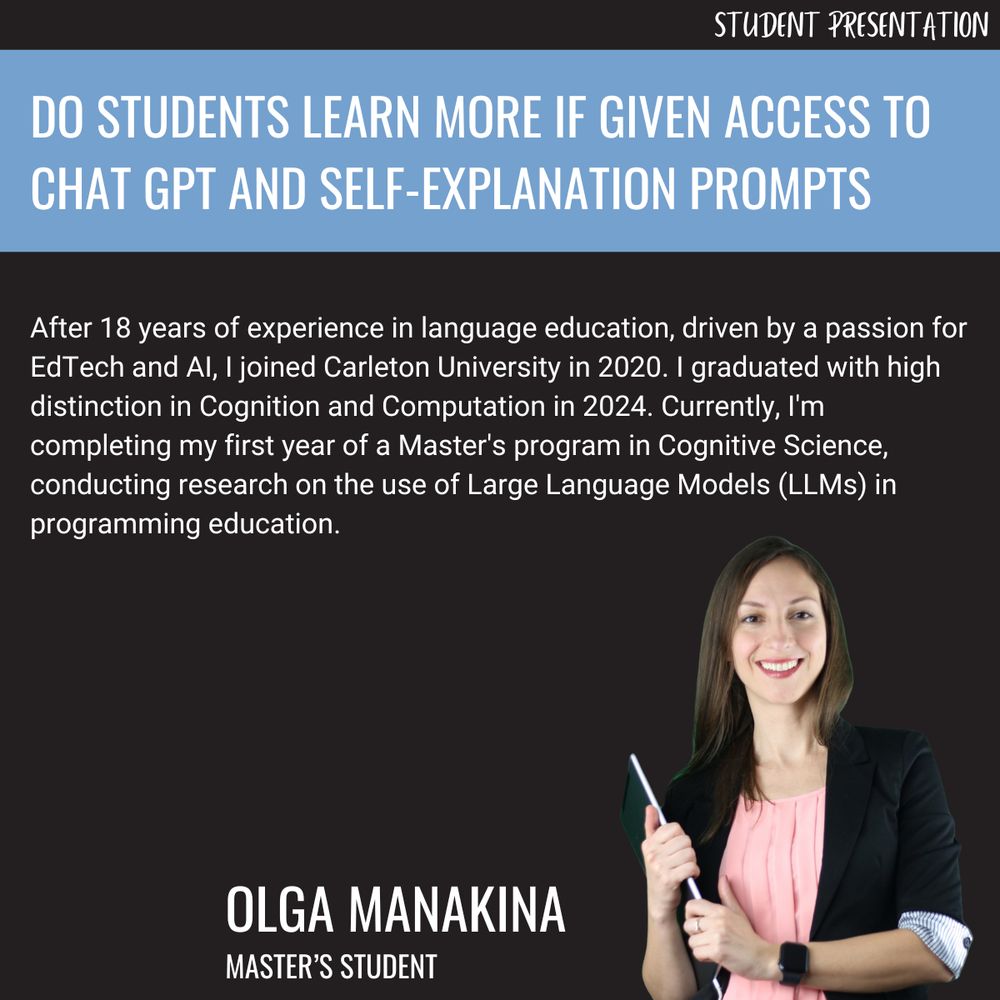
After 18 years of experience in language education, driven by a passion for EdTech and AI, I joined Carleton University in 2020. I graduated with high distinction in Cognition and Computation in 2024. Currently, I'm completing my first year of a Master's program in Cognitive Science, conducting research on the use of Large Language Models (LLMs) in programming education.
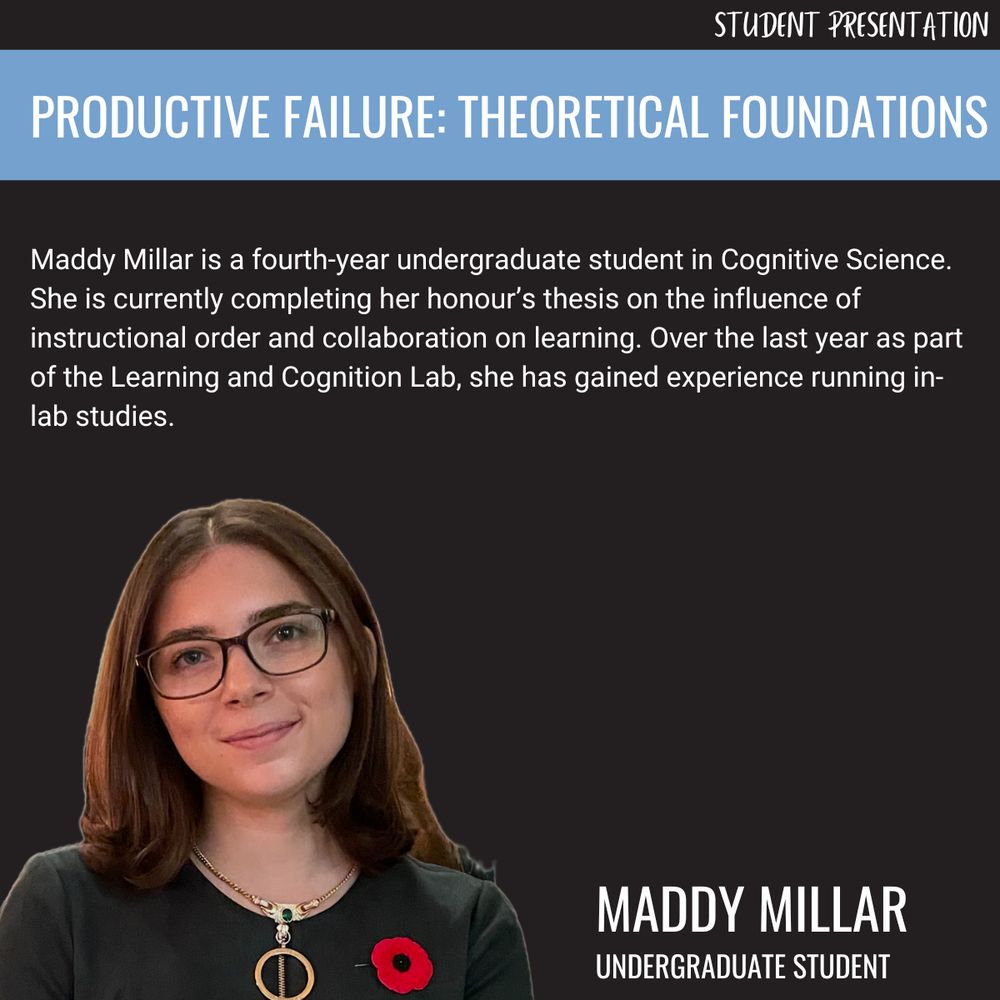
Maddy Millar is a fourth-year undergraduate student in Cognitive Science. She is currently completing her honour’s thesis on the influence of instructional order and collaboration on learning. Over the last year as part of the Learning and Cognition Lab, she has gained experience running in-lab studies.
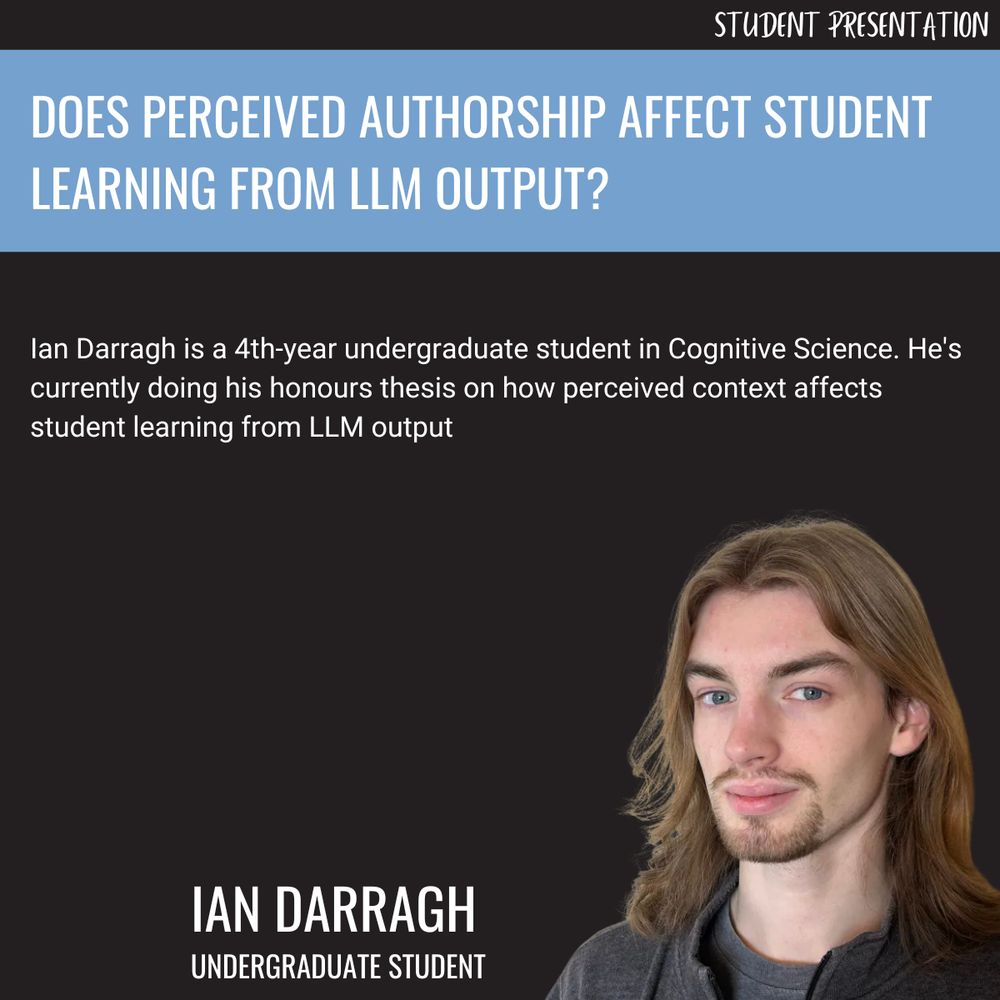
Ian Darragh is a 4th-year undergraduate student in Cognitive Science. He's currently doing his honours thesis on how perceived context affects student learning from LLM output
Olga Manakina: Do students learn more if given access to chat GPT and self-explanation prompts?
Maddy Millar: Productive Failure: Theoretical Foundations
Ian Darragh: Does perceived authorship affect student learning from LLM output?
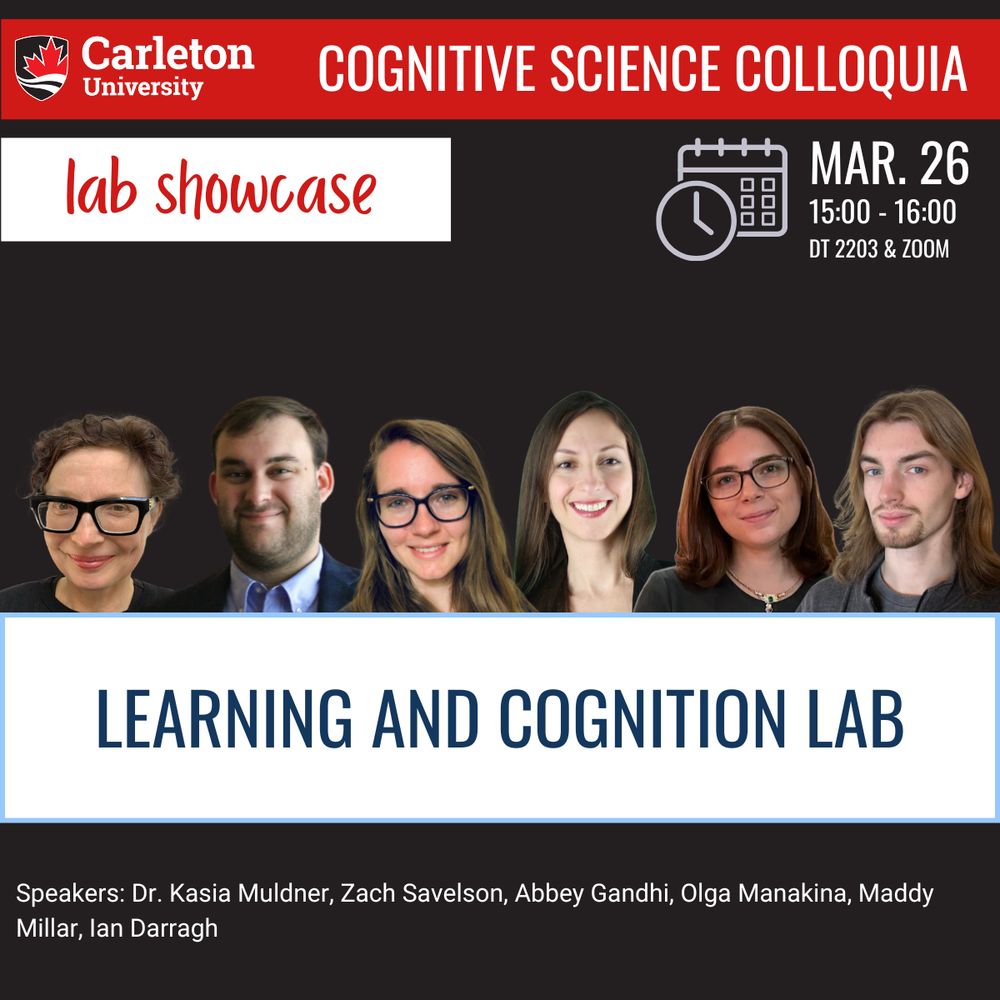
promo
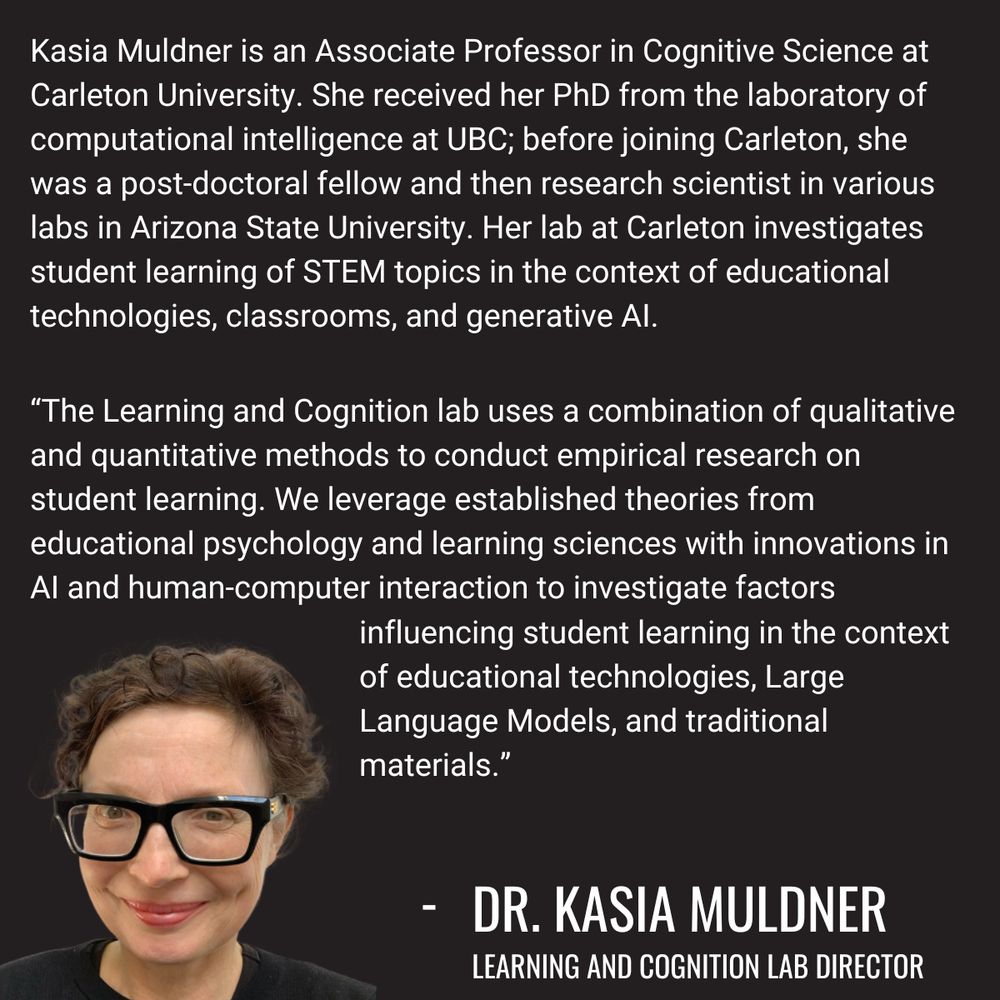
Kasia Muldner is an Associate Professor in Cognitive Science at Carleton University. She received her PhD from the laboratory of computational intelligence at UBC; before joining Carleton, she was a post-doctoral fellow and then research scientist in various labs in Arizona State University. Her lab at Carleton investigates student learning of STEM topics in the context of educational technologies, classrooms, and generative AI. “The Learning and Cognition lab uses a combination of qualitative and quantitative methods to conduct empirical research on student learning. We leverage established theories from educational psychology and learning sciences with innovations in AI and human-computer interaction to investigate factors influencing student learning in the context of educational technologies, Large Language Models, and traditional materials.”
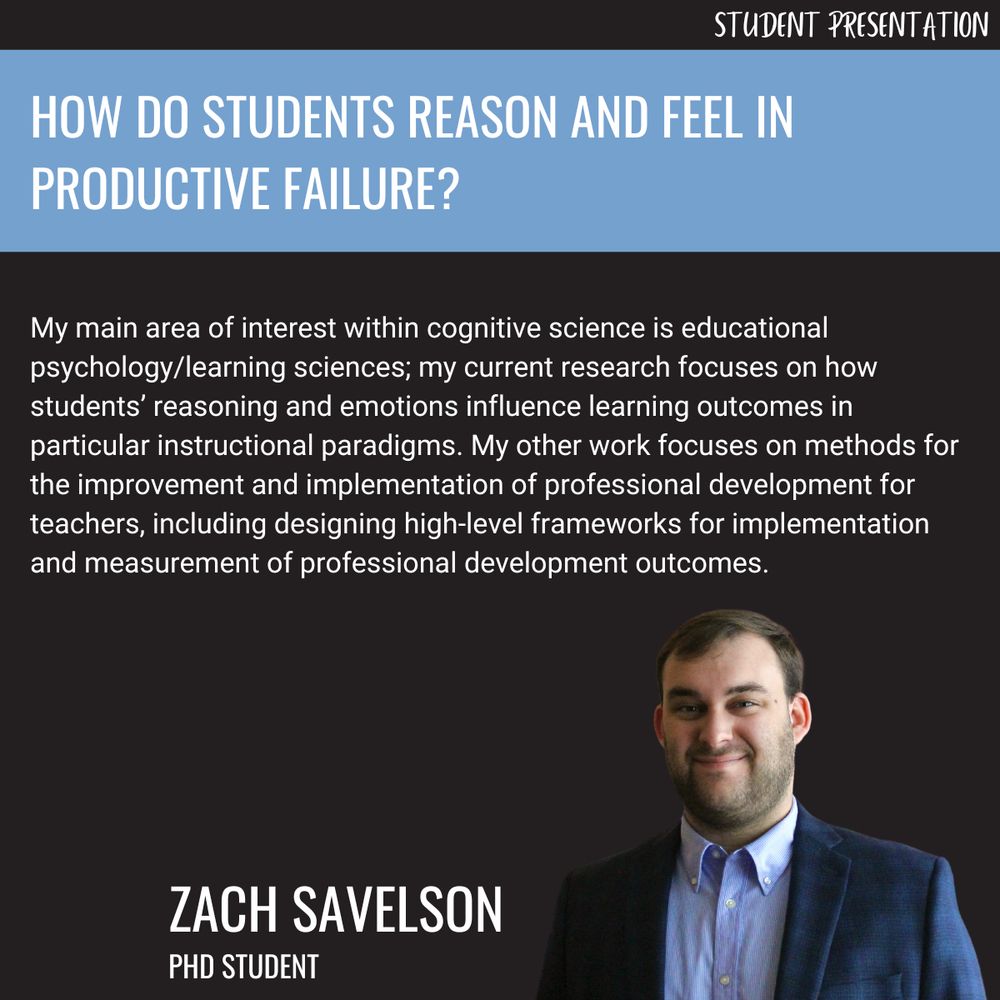
Zach Savelson: My main area of interest within cognitive science is educational psychology/learning sciences; my current research focuses on how students’ reasoning and emotions influence learning outcomes in particular instructional paradigms. My other work focuses on methods for the improvement and implementation of professional development for teachers, including designing high-level frameworks for implementation and measurement of professional development outcomes.
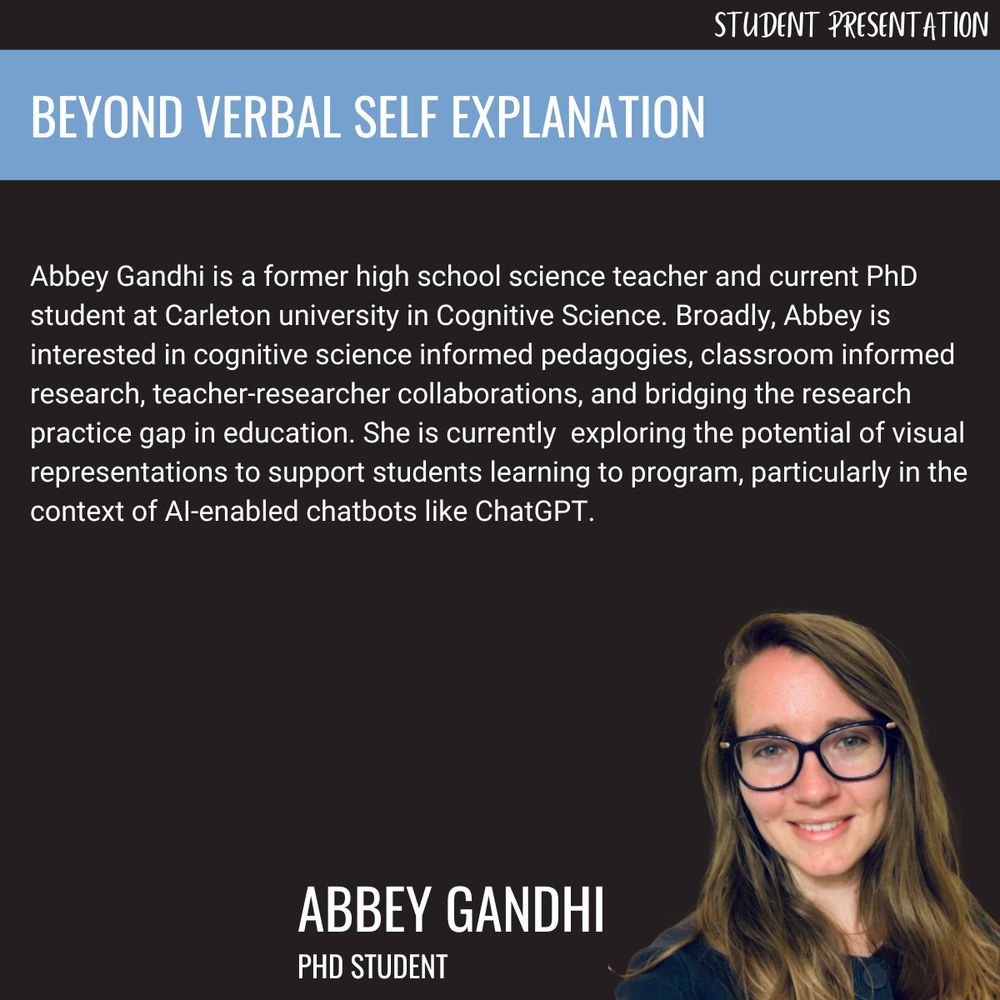
Abbey Gandhi is a former high school science teacher and current PhD student at Carleton university in Cognitive Science. Broadly, Abbey is interested in cognitive science informed pedagogies, classroom informed research, teacher-researcher collaborations, and bridging the research practice gap in education. She is currently exploring the potential of visual representations to support students learning to program, particularly in the context of AI-enabled chatbots like ChatGPT.
This Wed, Mar 26, 15:00: learn about the Language and Cognition lab (director: Dr. Kasia Muldner)!
On campus (DT2203) and on Zoom (carleton-ca.zoom.us/j/97410479268)
Presentations:
Zach Savelson: How do students reason and feel in productive failure?
Abbey Gandhi: Beyond verbal self explanation

Jim Davies interviewed on CBC Ottawa Morning about the promises and dangers of generative artificial intelligence into school curricula. 10m. Listen at: www.cbc.ca/listen/live-...
@carletonu.bsky.social @carleton-cogsci.bsky.social @drjimdavies.bsky.social @mindingthebrain.bsky.social
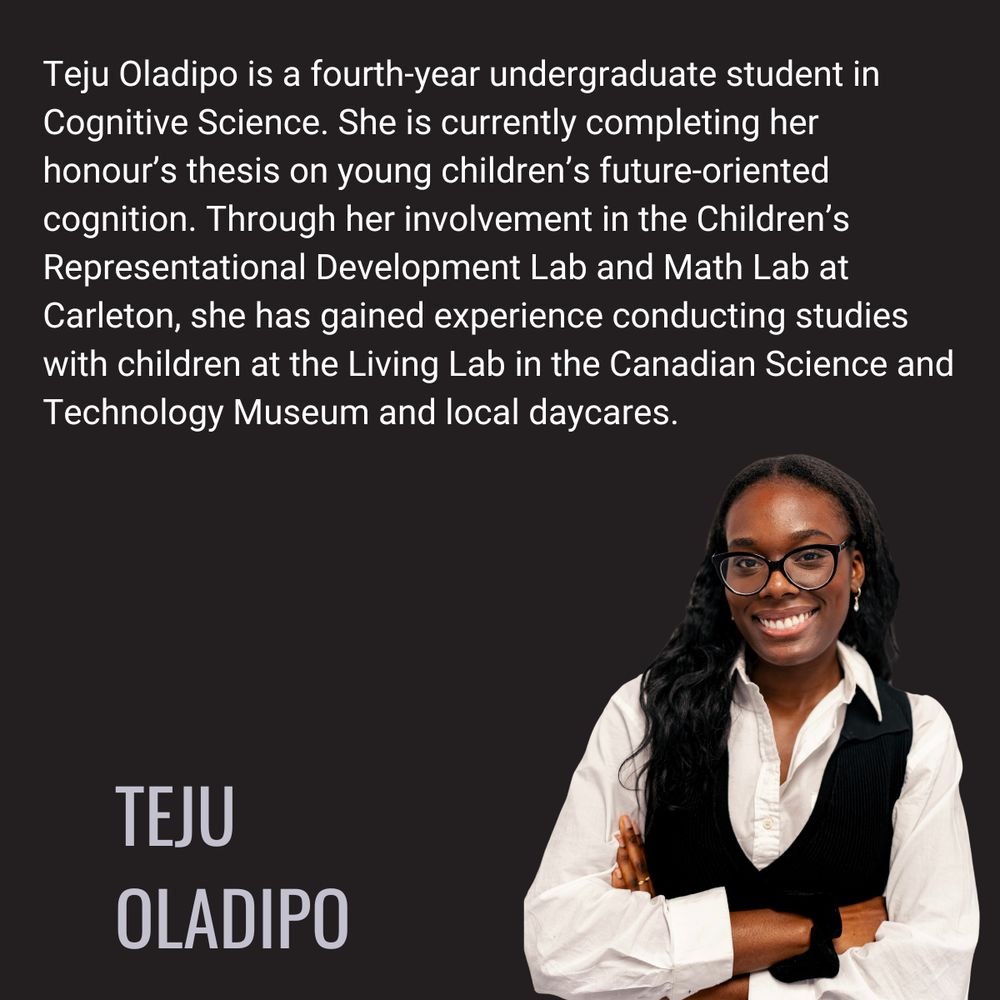
Teju Oladipo is a fourth-year undergraduate student in Cognitive Science. She is currently completing her honour’s thesis on young children’s future-oriented cognition. Through her involvement in the Children’s Representational Development Lab and Math Lab at Carleton, she has gained experience conducting studies with children at the Living Lab in the Canadian Science and Technology Museum and local daycares.
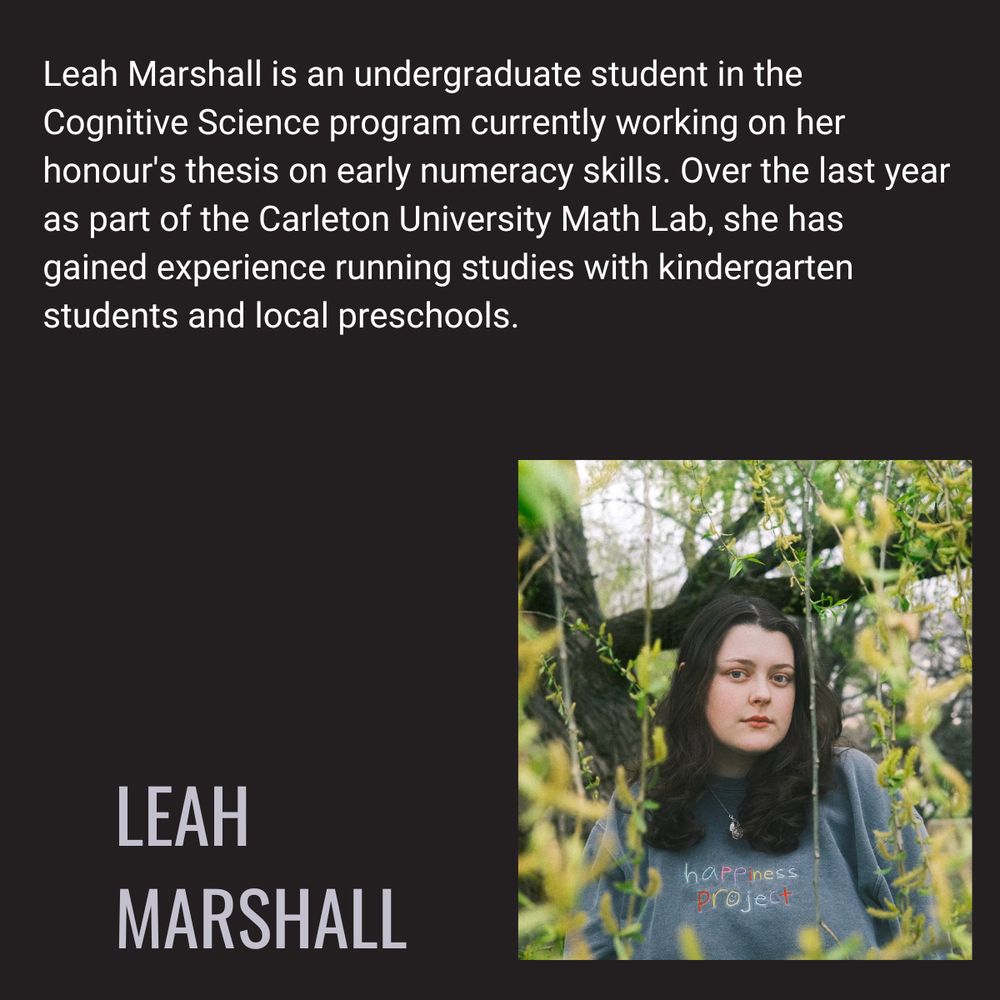
Leah Marshall is an undergraduate student in the Cognitive Science program currently working on her honour's thesis on early numeracy skills. Over the last year as part of the Carleton University Math Lab, she has gained experience running studies with kindergarten students and local preschools.
17.03.2025 17:42 — 👍 0 🔁 0 💬 0 📌 0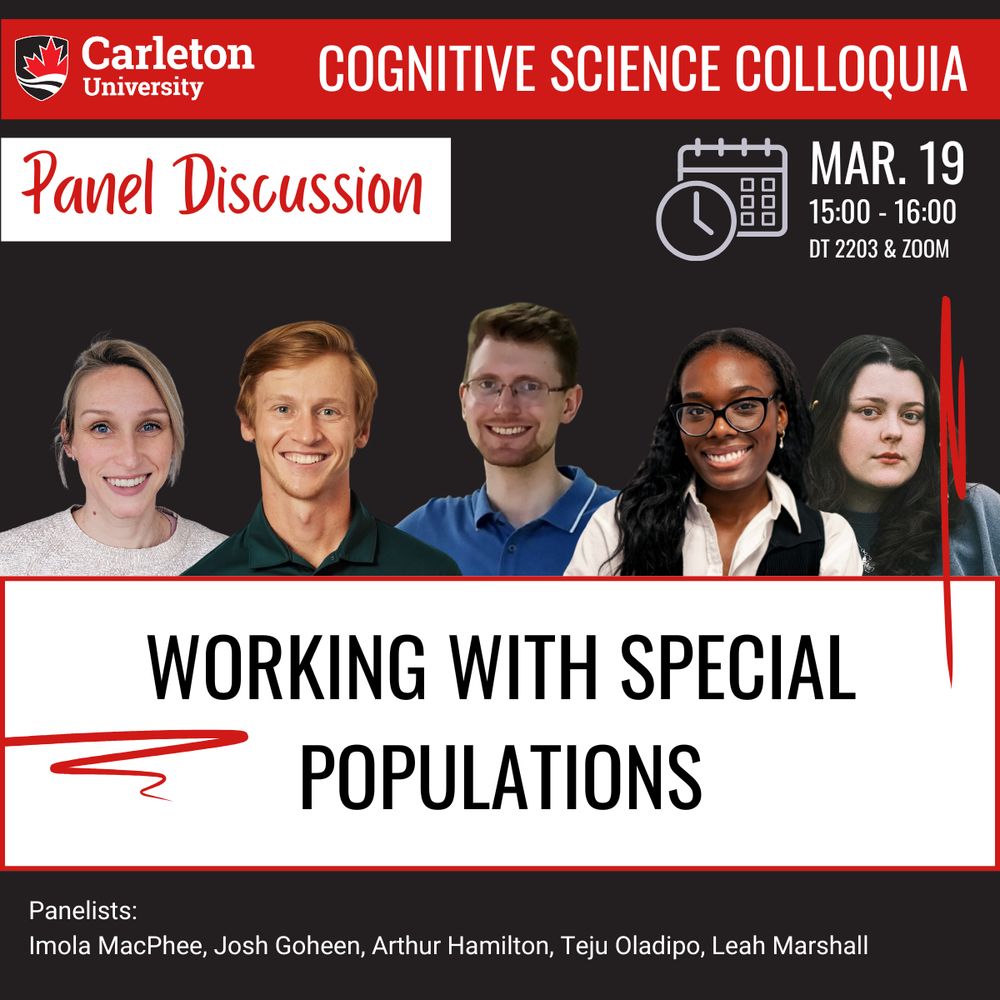
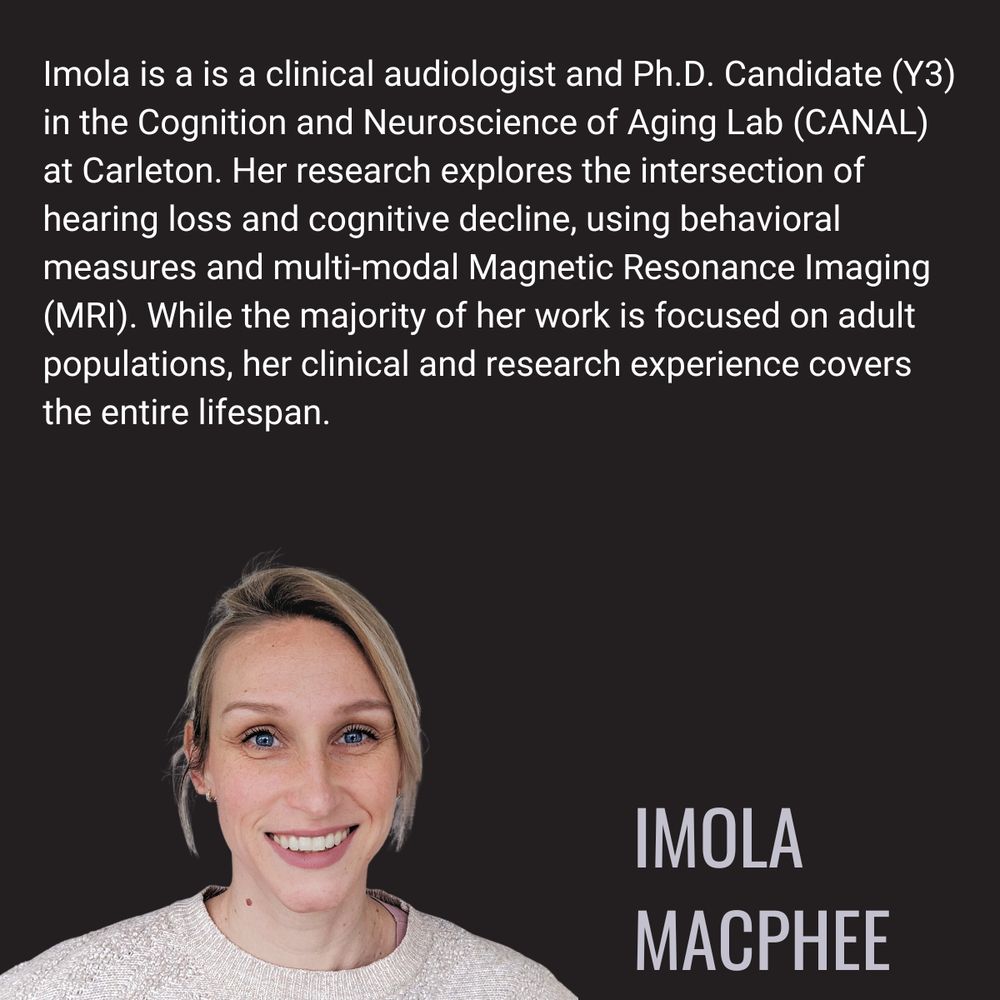
Imola is a is a clinical audiologist and Ph.D. Candidate (Y3) in the Cognition and Neuroscience of Aging Lab (CANAL) at Carleton. Her research explores the intersection of hearing loss and cognitive decline, using behavioral measures and multi-modal Magnetic Resonance Imaging (MRI). While the majority of her work is focused on adult populations, her clinical and research experience covers the entire lifespan.
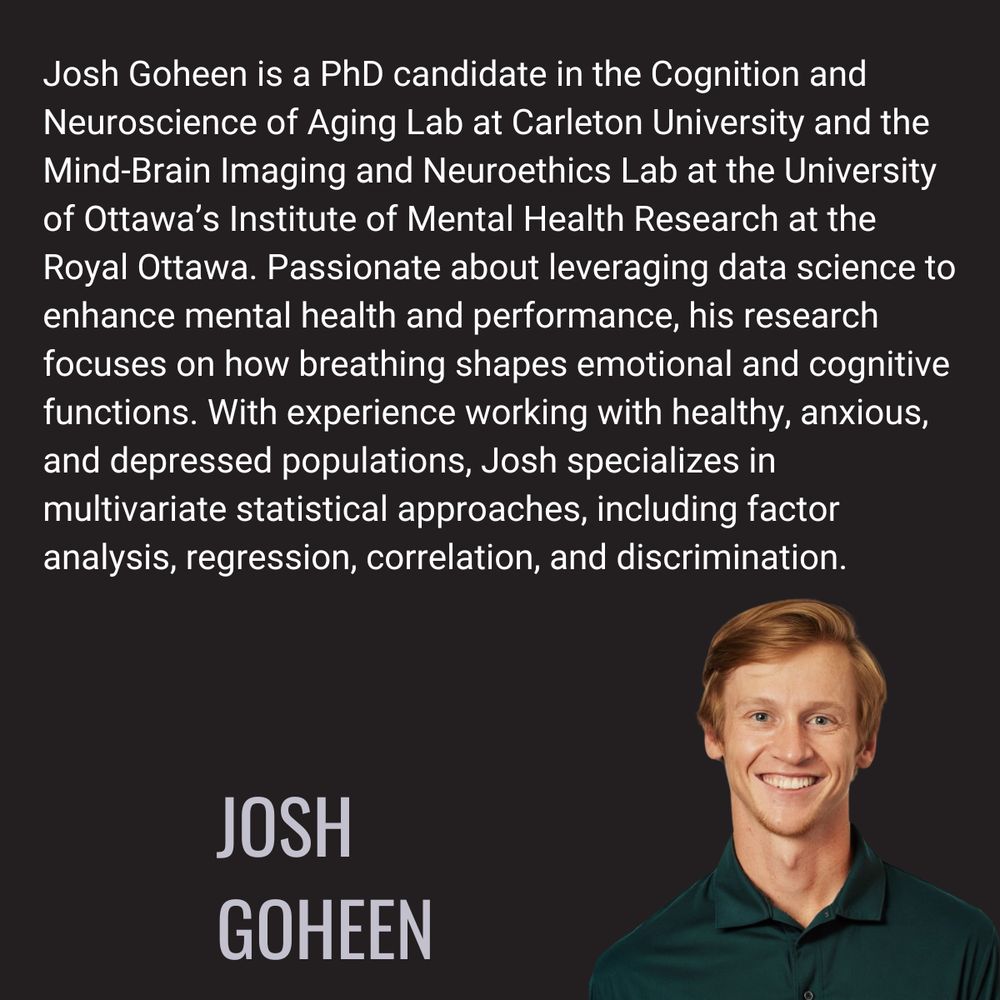
Josh Goheen is a PhD candidate in the Cognition and Neuroscience of Aging Lab at Carleton University and the Mind-Brain Imaging and Neuroethics Lab at the University of Ottawa’s Institute of Mental Health Research at the Royal Ottawa. Passionate about leveraging data science to enhance mental health and performance, his research focuses on how breathing shapes emotional and cognitive functions. With experience working with healthy, anxious, and depressed populations, Josh specializes in multivariate statistical approaches, including factor analysis, regression, correlation, and discrimination.
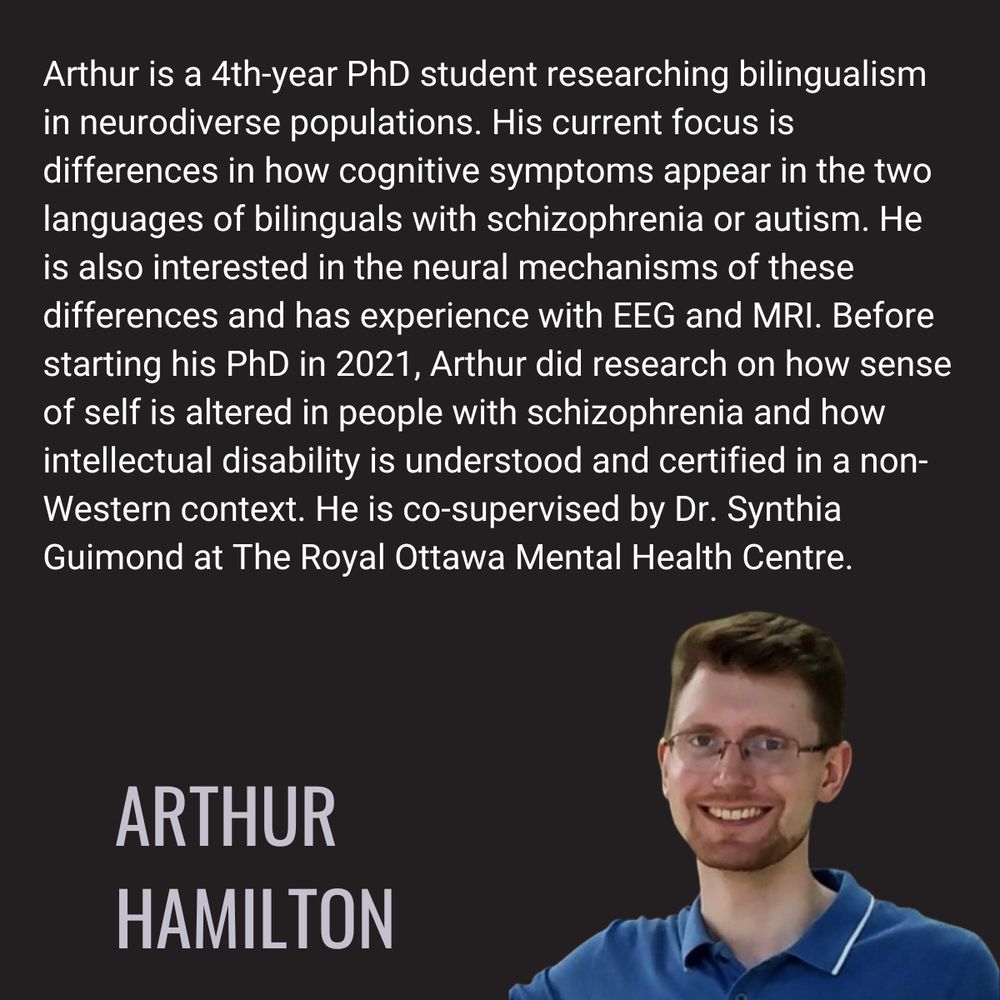
Arthur is a 4th-year PhD student researching bilingualism in neurodiverse populations. His current focus is differences in how cognitive symptoms appear in the two languages of bilinguals with schizophrenia or autism. He is also interested in the neural mechanisms of these differences and has experience with EEG and MRI. Before starting his PhD in 2021, Arthur did research on how sense of self is altered in people with schizophrenia and how intellectual disability is understood and certified in a non-Western context. He is co-supervised by Dr. Synthia Guimond at The Royal Ottawa Mental Health Centre.
Join us this Wednesday (March 19, 15:00-16:00EST) for a panel discussion "Working with Special Populations".
Everyone is welcome! You can attend on campus (DT2203) or on Zoom (carleton-ca.zoom.us/j/95558414437)
Panelists: Imola MacPhee, Josh Goheen, Arthur Hamilton, Teju Oladipo, Leah Marshall
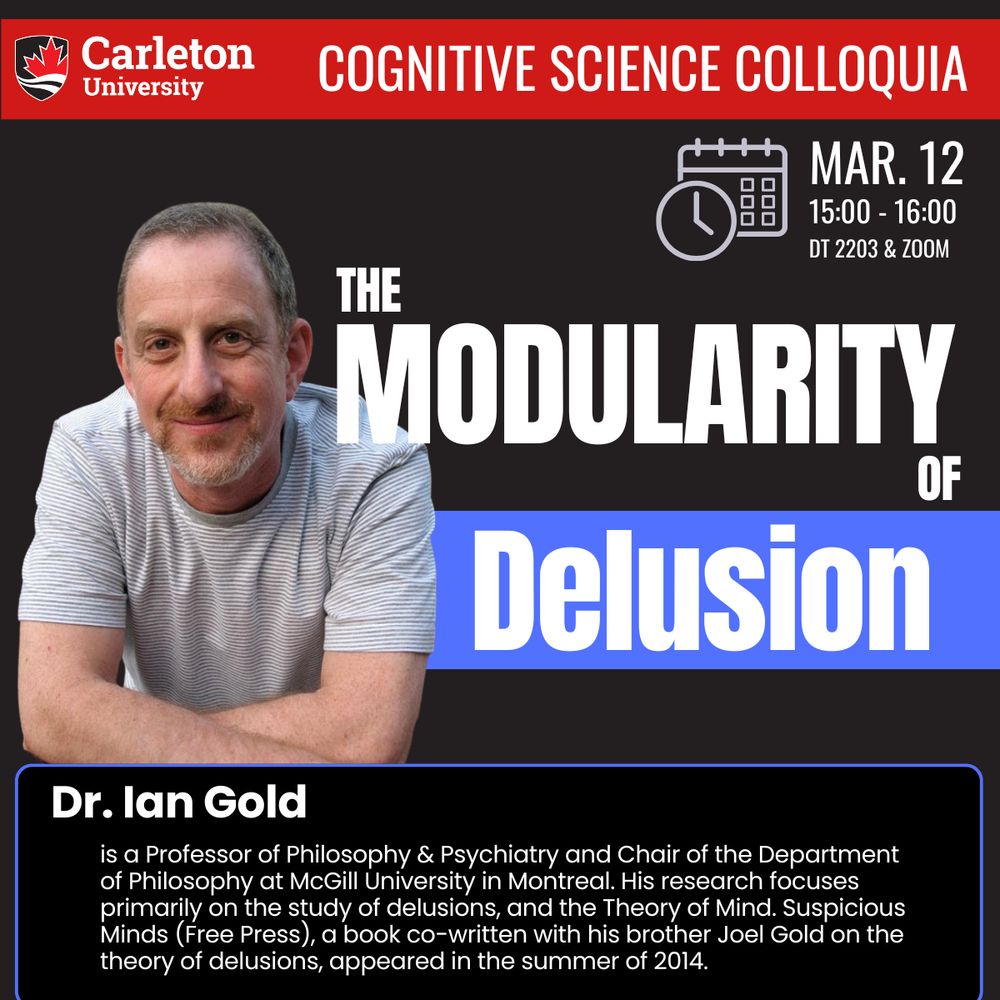
Dr. Gold is a Professor of Philosophy & Psychiatry and Chair of the Department of Philosophy at McGill University in Montreal. His research focuses primarily on the study of delusions, and the Theory of Mind. Suspicious Minds (Free Press), a book co-written with his brother Joel Gold on the theory of delusions, appeared in the summer of 2014.
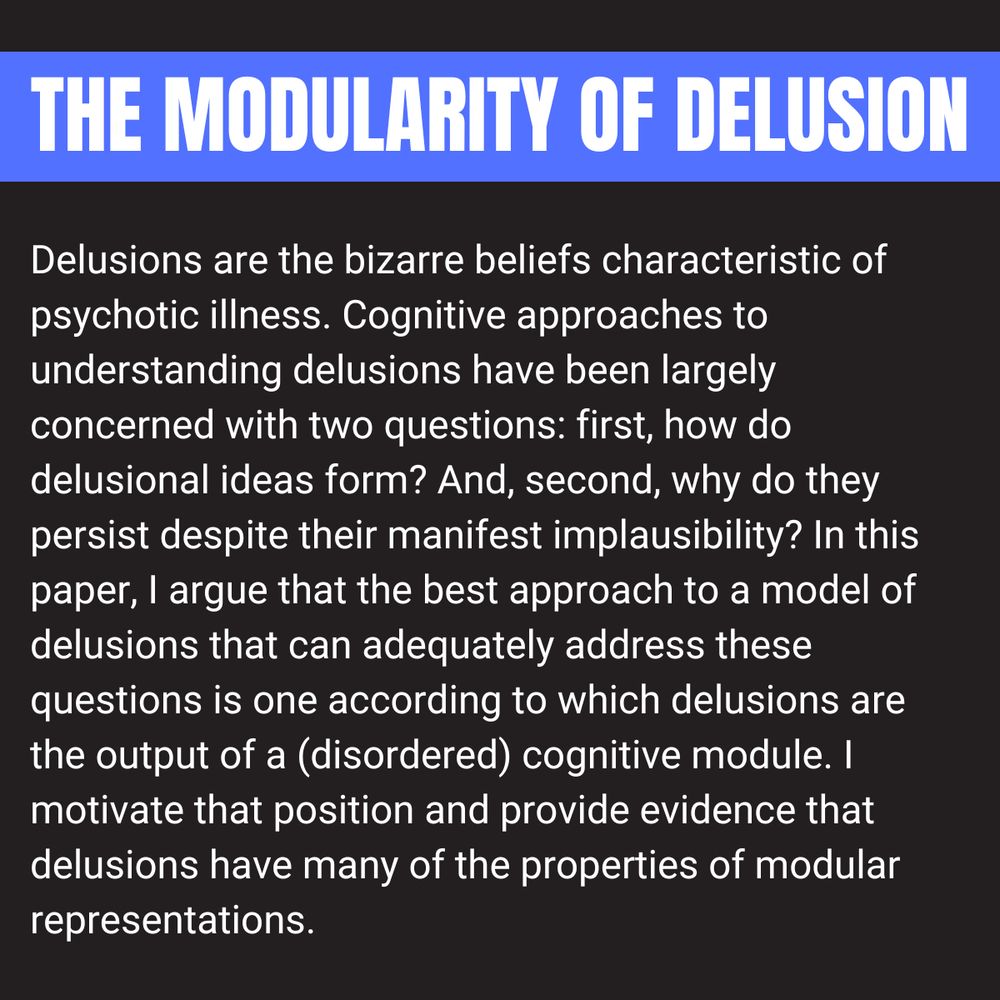
Abstract: Delusions are the bizarre beliefs characteristic of psychotic illness. Cognitive approaches to understanding delusions have been largely concerned with two questions: first, how do delusional ideas form? And, second, why do they persist despite their manifest implausibility? In this paper, I argue that the best approach to a model of delusions that can adequately address these questions is one according to which delusions are the output of a (disordered) cognitive module. I motivate that position and provide evidence that delusions have many of the properties of modular representations.
Join us this Wednesday, March 12, from 15:00-16:00EST to learn more about "The Modularity of Delusion" with Dr. Ian Gold. Everyone is welcome to attend. You can join in person (DT2203) or via Zoom carleton-ca.zoom.us/j/99343590320
10.03.2025 15:08 — 👍 2 🔁 0 💬 0 📌 0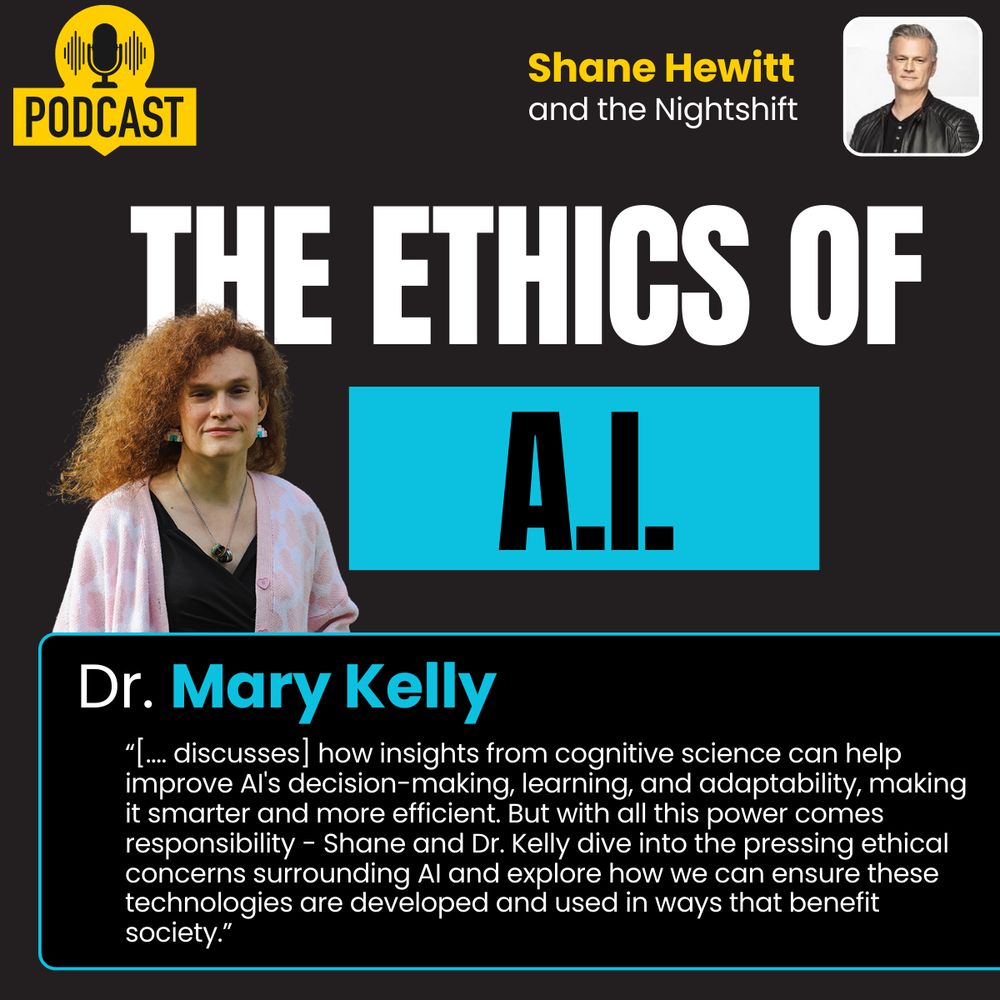
"Shane Hewitt sits down with Dr. Mary Kelly, a cognitive scientist and Assistant Professor at Carleton University, to explore the groundbreaking concept of making artificial intelligence more effective by replicating the human brain. They discuss how insights from cognitive science can help improve AI's decision-making, learning, and adaptability, making it smarter and more efficient. But with all this power comes responsibility—Shane and Dr. Kelly dive into the pressing ethical concerns surrounding AI and explore how we can ensure these technologies are developed and used in ways that benefit society."
Podcast alert! Earlier this month, Dr. Mary Kelly discussed the ethics of A.I. with Shane Hewitt and the Nightshift: www.iheart.com/podcast/962-...
27.02.2025 18:12 — 👍 2 🔁 1 💬 0 📌 0Speakers:
Raj Singh (co-director of LOLA Lab)
Sam Vassa (CEO of PaymentEvolution)
Katie Van Luven (PhD student)
Masih Zaamari (PhD student)
Sean Riley (PhD student)
Samer Al Assafin (PhD student)
Tara Azin (PhD student)
@landonclliu.bsky.social
Hollen Lo (undergraduate student)
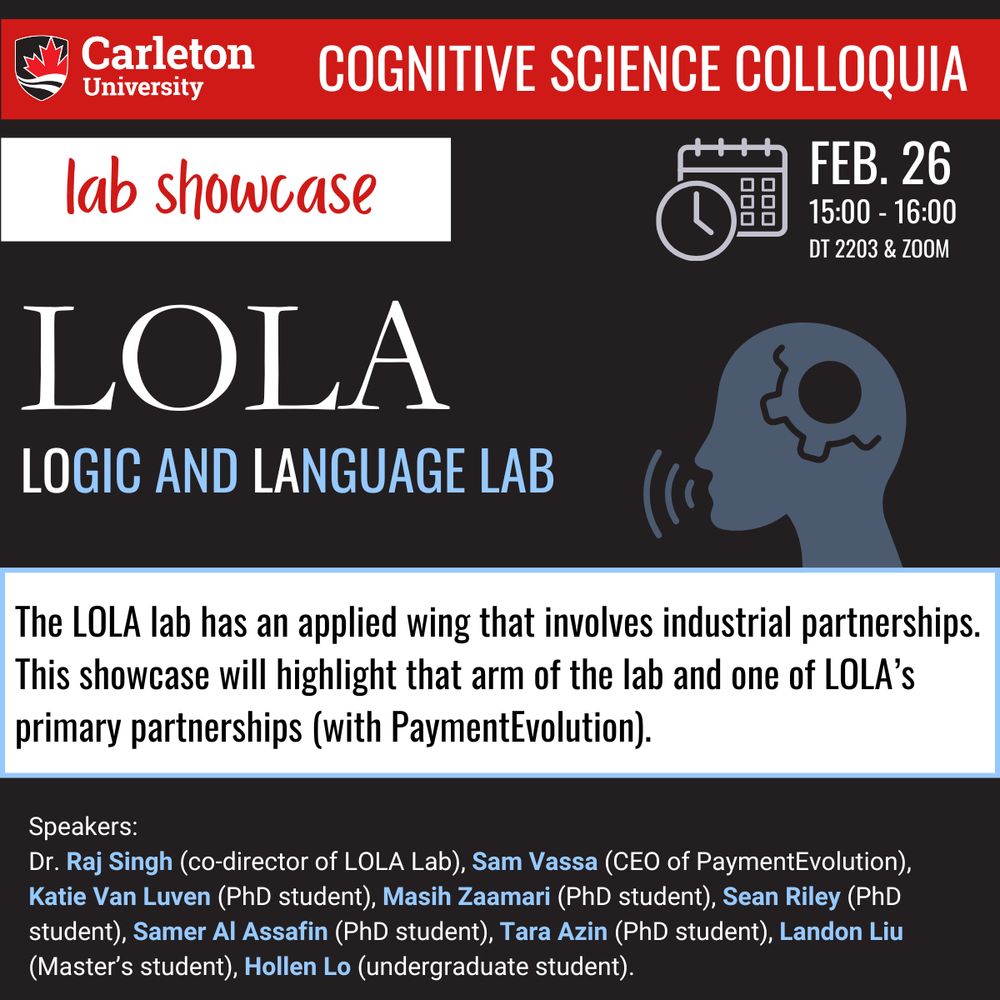
The LOLA lab has an applied wing that involves industrial partnerships. This showcase will highlight that arm of the lab and one of LOLA’s primary partnerships (with PaymentEvolution).
📢 Join us this Wednesday (Feb 26, 15:00-16:00EST) for a Lab Showcase featuring The Logic and Language (LOLA) lab and their industrial partnership with PaymentEvolution.
Everyone is welcome! You can join on campus (DT2203) or online via Zoom (carleton-ca.zoom.us/j/93858715712)
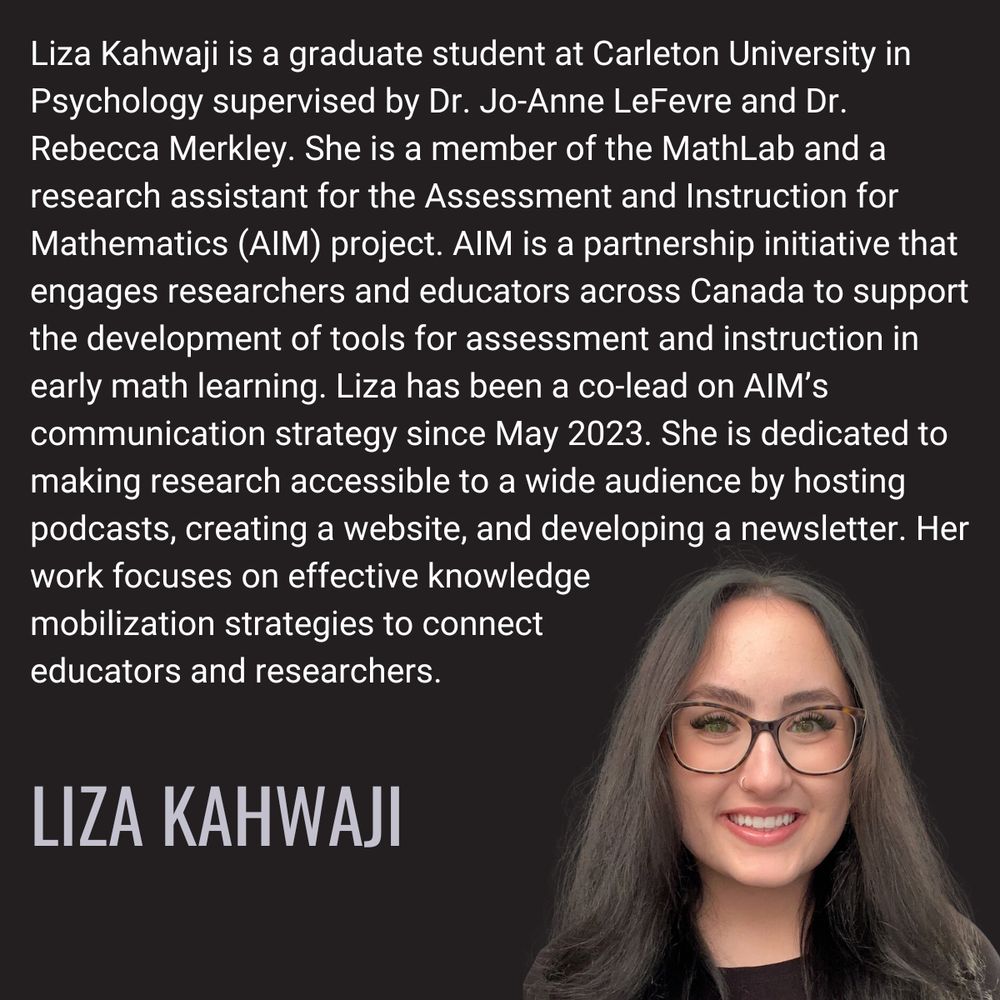
Liza Kahwaji is a graduate student at Carleton University in Psychology supervised by Dr. Jo-Anne LeFevre and Dr. Rebecca Merkley. She is a member of the MathLab and a research assistant for the Assessment and Instruction for Mathematics (AIM) project. AIM is a partnership initiative that engages researchers and educators across Canada to support the development of tools for assessment and instruction in early math learning. Liza has been a co-lead on AIM’s communication strategy since May 2023. She is dedicated to making research accessible to a wide audience by hosting podcasts, creating a website, and developing a newsletter. Her work focuses on effective knowledge mobilization strategies to connect educators and researchers.
10.02.2025 15:24 — 👍 2 🔁 0 💬 0 📌 0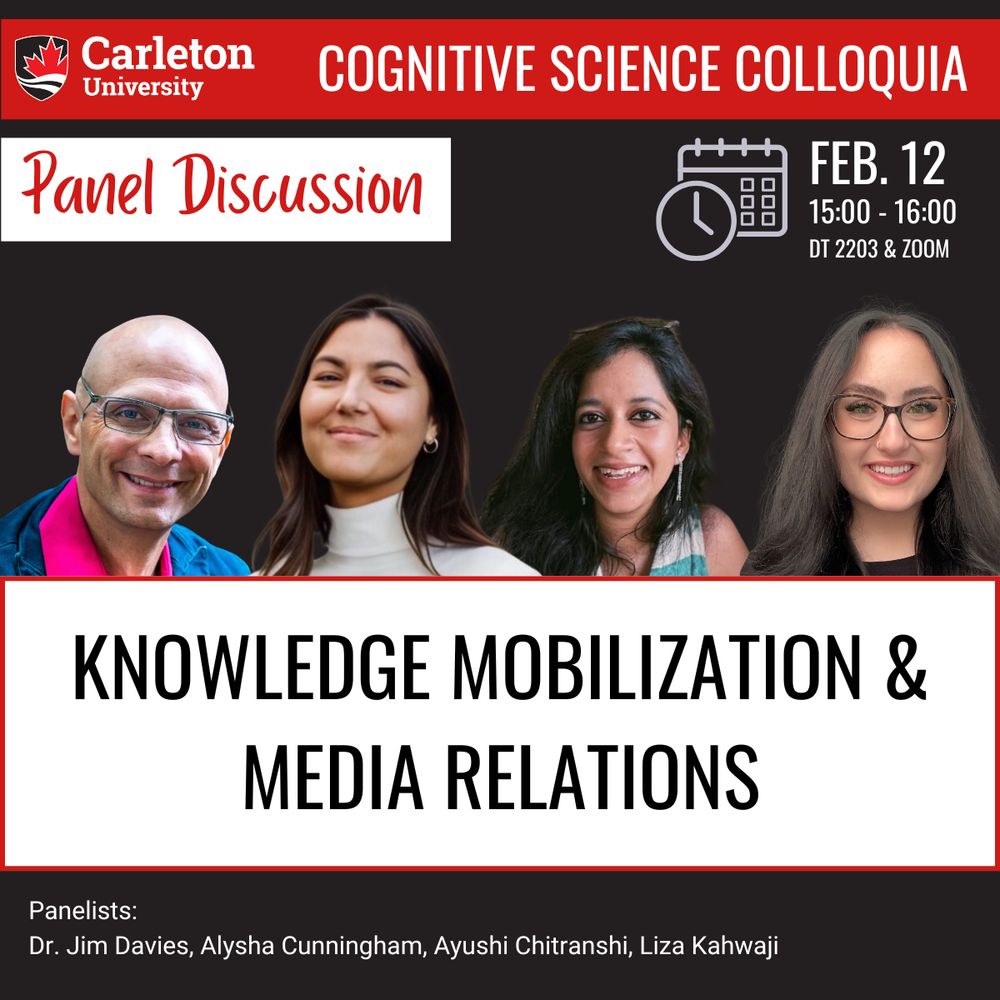
promo image
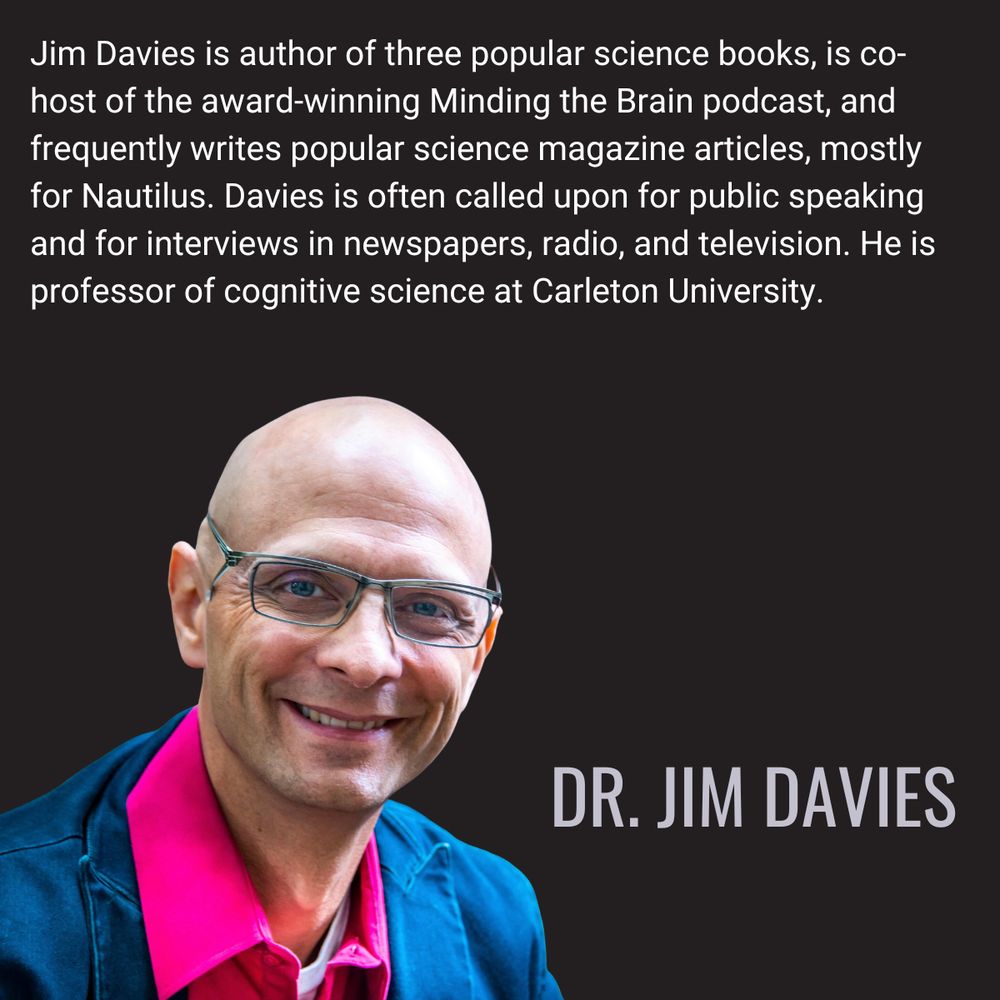
Jim Davies is author of three popular science books, is co-host of the award-winning Minding the Brain podcast, and frequently writes popular science magazine articles, mostly for Nautilus. Davies is often called upon for public speaking and for interviews in newspapers, radio, and television. He is professor of cognitive science at Carleton University.
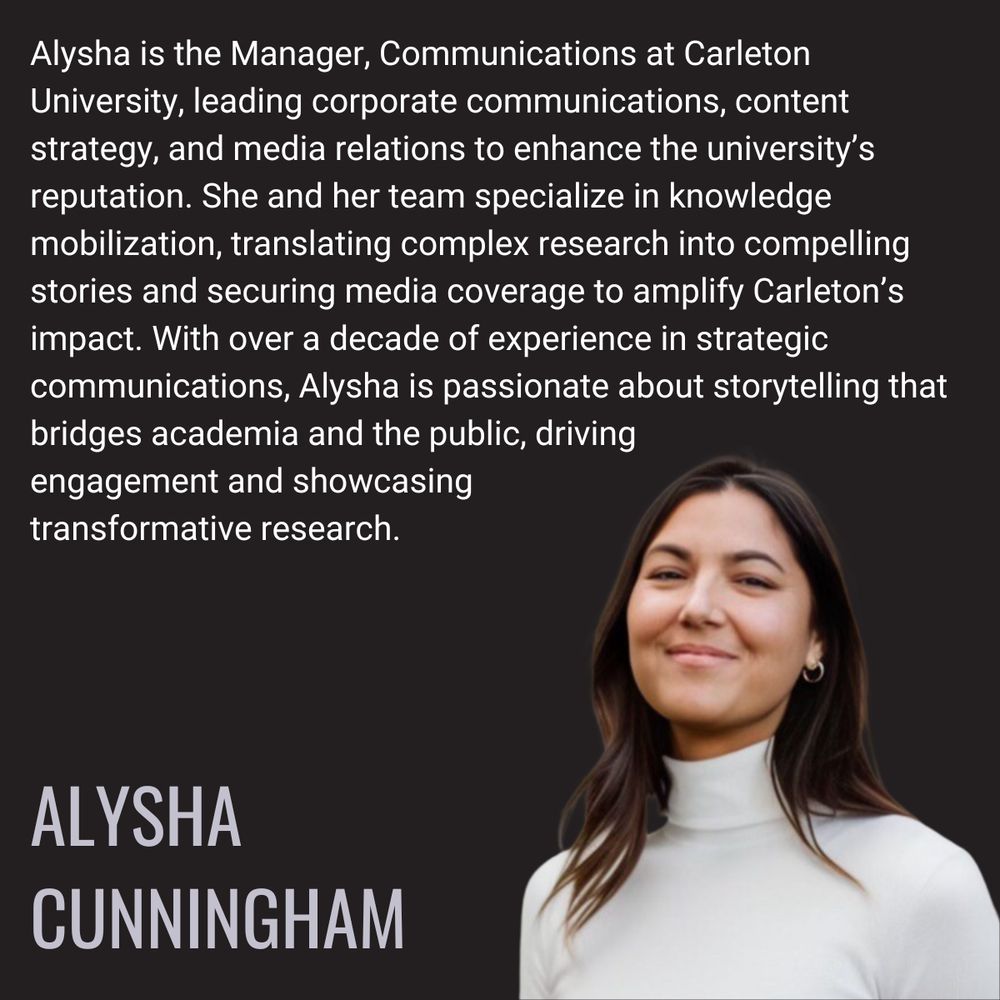
Alysha Cunningham is the Manager, Communications at Carleton University, leading corporate communications, content strategy, and media relations to enhance the university’s reputation. She and her team specialize in knowledge mobilization, translating complex research into compelling stories and securing media coverage to amplify Carleton’s impact. With over a decade of experience in strategic communications, Alysha is passionate about storytelling that bridges academia and the public, driving engagement and showcasing transformative research.
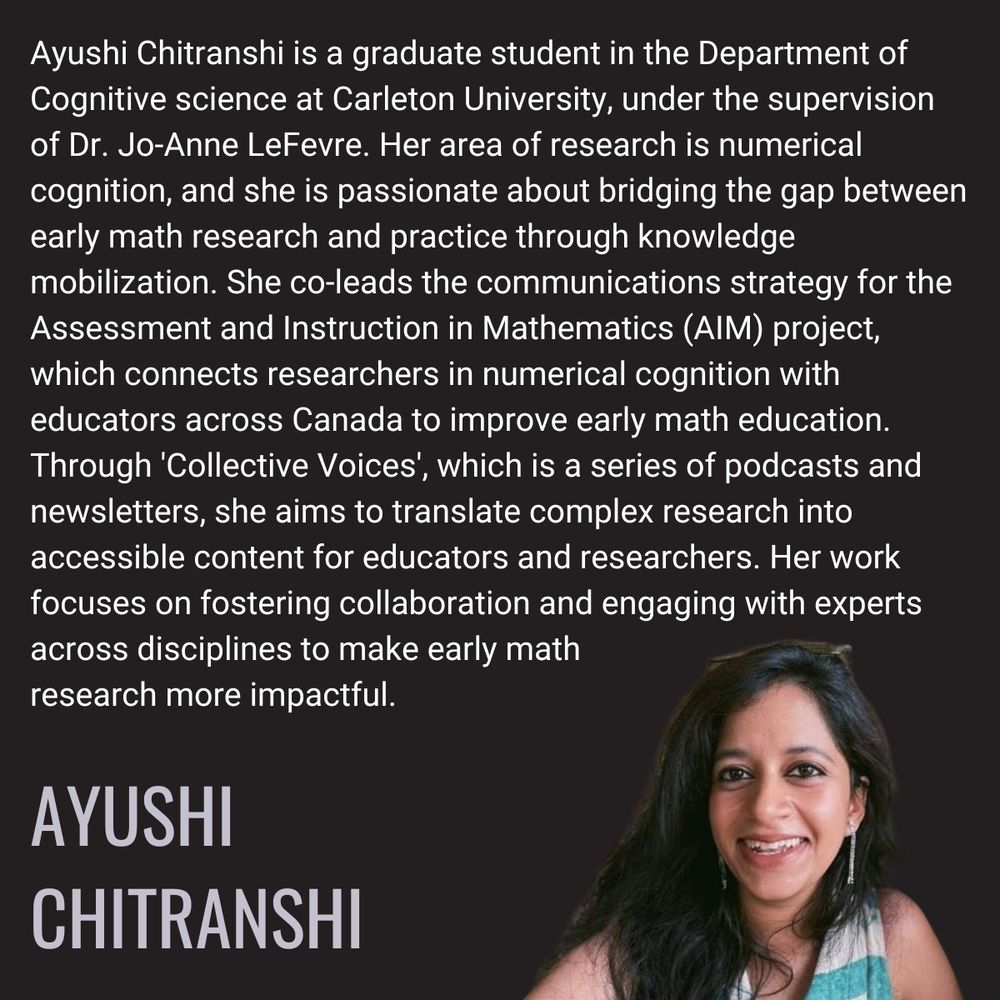
Ayushi Chitranshi is a graduate student in the Department of Cognitive science at Carleton University, under the supervision of Dr. Jo-Anne LeFevre. Her area of research is numerical cognition, and she is passionate about bridging the gap between early math research and practice through knowledge mobilization. She co-leads the communications strategy for the Assessment and Instruction in Mathematics (AIM) project, which connects researchers in numerical cognition with educators across Canada to improve early math education. Through 'Collective Voices', which is a series of podcasts and newsletters, she aims to translate complex research into accessible content for educators and researchers. Her work focuses on fostering collaboration and engaging with experts across disciplines to make early math research more impactful.
📢 Join us this Wednesday (Feb. 12, 15:00-16:00) for a panel discussion on "Knowledge Mobilization & Media Relations".
DT2203 & Zoom: carleton-ca.zoom.us/j/91684294578
Panelists: Dr. Jim Davies @drjimdavies.bsky.social, Alysha Cunningham, Ayushi Chitranshi, Liza Kahwaji
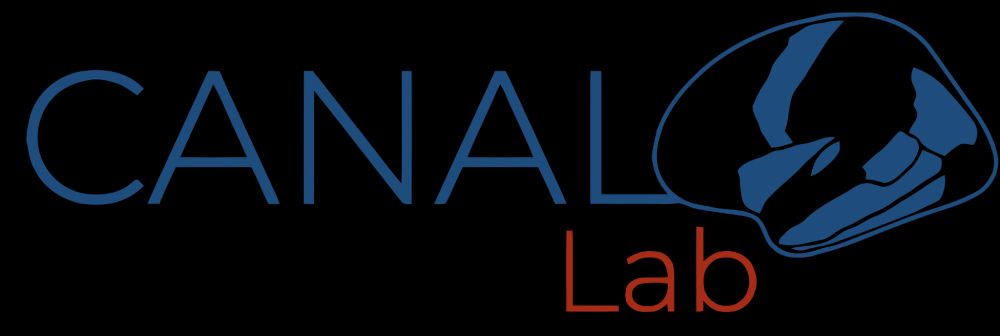
I'm currently interested in recruiting a master's student for this Fall 2025 to the CANAL lab. We're about to launch an MRI project focused on the intersection of #aging, #hearing, and #cognitivereserve
Please get in touch!
www.canallab.ca/contact #neuroscience @carleton-cogsci.bsky.social
Spencer Eckler: Mechanistic Evidence for Cognitive Theories of Reasoning through Task Simulation
Connor Hanley: Extending Vector-Symbolic LISP with Number Encoding
Presentations by:
Dr. Mary Kelly (ANIMUS lab director)
Maria Vorobeva: Evolution of Intelligence
Eilene Tomkins-Flanagan: Integration of Cognitive Theory Through Computational Modelling
Adaptive Neuromorphics, Intelligence, Memory and Unified Systems (ANIMUS) lab studies cognition seeks to address the shortcomings of current AI models in representing characteristics of cognition, by using evidence found across cognitive disciplines to design models with more human-like behaviour.
27.01.2025 19:48 — 👍 1 🔁 0 💬 1 📌 0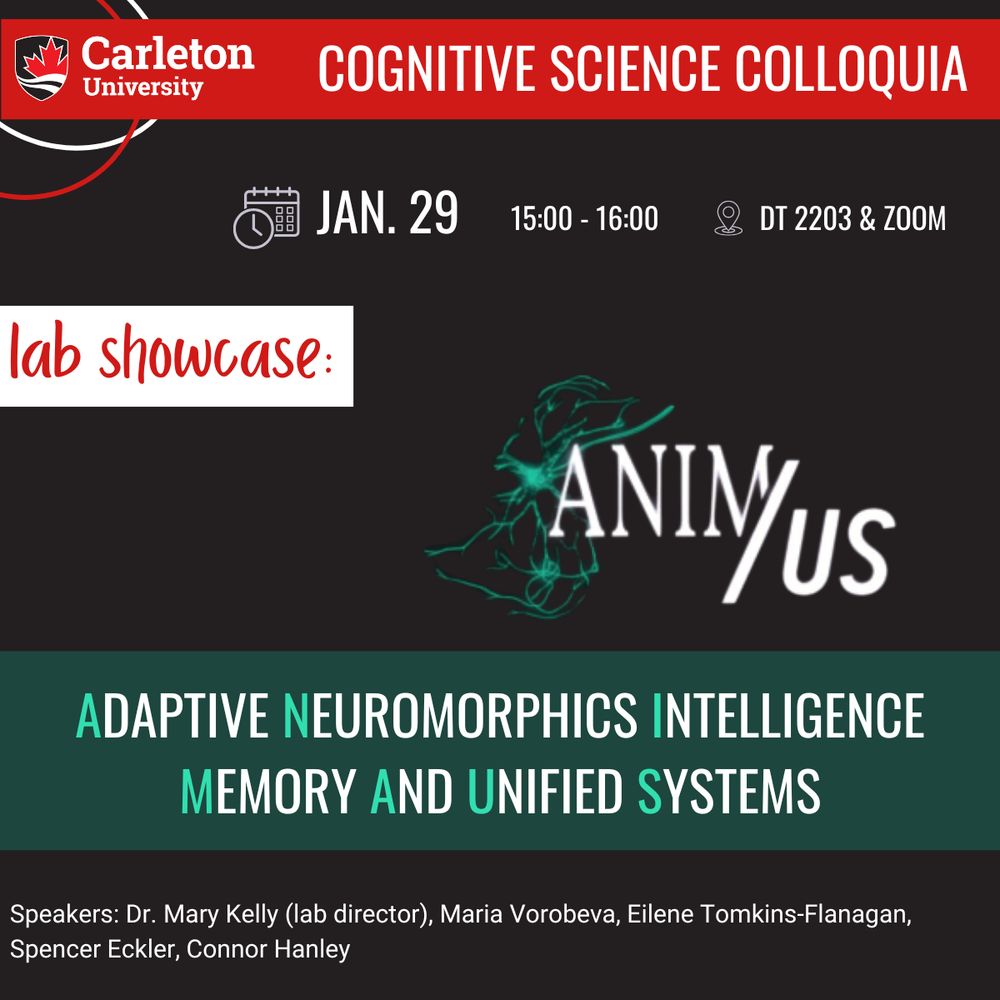
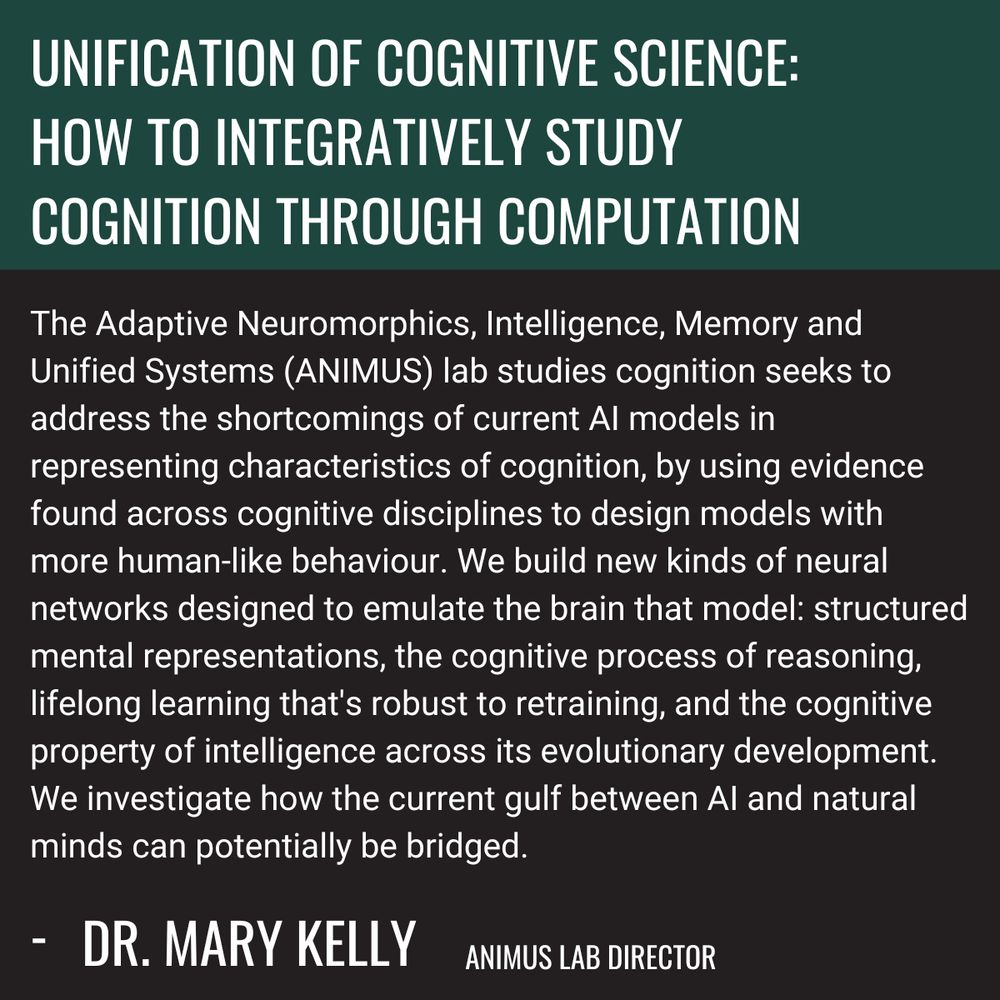
Unification of Cognitive Science: How to integratively study cognition through computation. The Adaptive Neuromorphics, Intelligence, Memory and Unified Systems (ANIMUS) lab studies cognition seeks to address the shortcomings of current AI models in representing characteristics of cognition, by using evidence found across cognitive disciplines to design models with more human-like behaviour. We build new kinds of neural networks designed to emulate the brain that model: structured mental representations, the cognitive process of reasoning, lifelong learning that's robust to retraining, and the cognitive property of intelligence across its evolutionary development. We investigate how the current gulf between AI and natural minds can potentially be bridged. - Dr. Mary Kelly
📢 Join us on Jan. 29 at 15:00 for our next colloquium: "Unification of Cognitive Science: How to integratively study cognition through computation". You can join on campus (DT2203) or on Zoom carleton-ca.zoom.us/j/9890875403...
27.01.2025 19:48 — 👍 3 🔁 0 💬 1 📌 0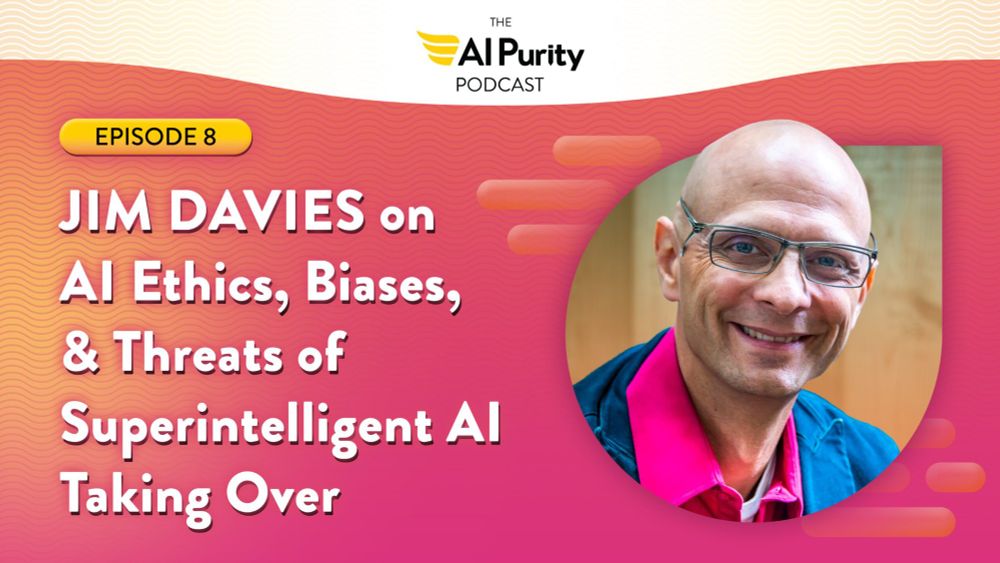
@drjimdavies.bsky.social Davies talks about the ethics of artificial intelligence, human bias, and threats of superintelligent AI in this article and podcast episode of AI Purity. Released August 2, 2024. www.ai-purity.com/podcast/cogn...
@carletonu.bsky.social @carleton-cogsci.bsky.social